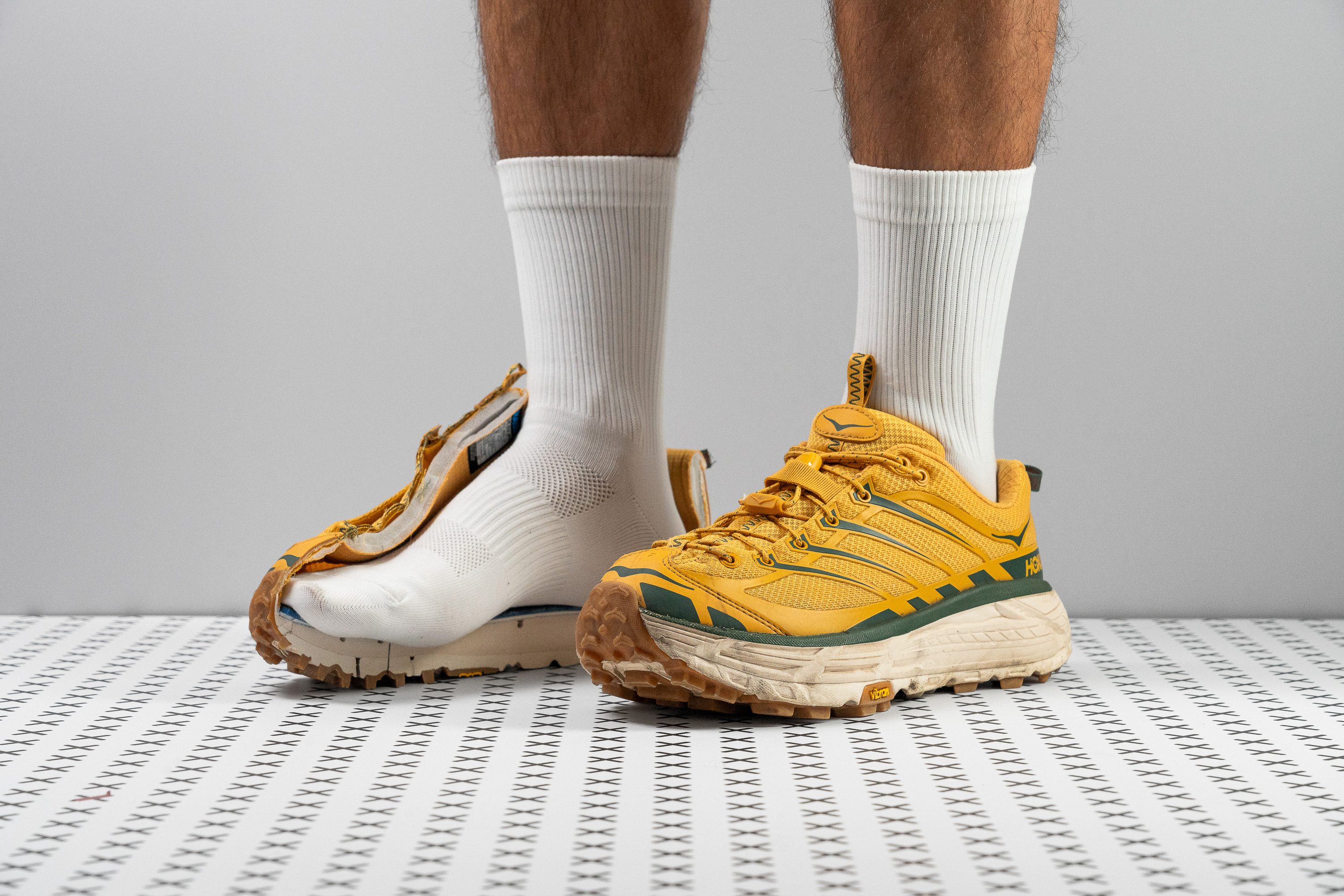Our verdict
Pros
- Unique mix of two shoes
- Serves as casual retro footwear
- Accurate heel-to-toe drop
- Exceptional Vibram outsole
- Outstanding durability
- Maximal cushioning
- Excellent stability
- Breathable
Cons
- Lacks reflective elements
- Quite heavy
- Only for narrow feet
Audience verdict
Comparison
The most similar running shoes compared
+ + Add a shoe | |||||
|---|---|---|---|---|---|
| Audience score | 77 Decent! | 84 Good! | 85 Good! | 88 Great! | |
| Price | £180 | £140 | £160 | £160 | |
| Trail terrain | Light | Light | LightModerate | ModerateTechnical | |
| Shock absorption | - | High | Moderate | Moderate | |
| Energy return | - | Moderate | Moderate | Moderate | |
| Arch support | Neutral | Neutral | Neutral | Neutral | |
| Weight lab Weight brand | 11.7 oz / 332g 11.6 oz / 329g | 10.9 oz / 309g 10.5 oz / 297g | 12.1 oz / 342g 12.9 oz / 365g | 10.3 oz / 293g 10.4 oz / 295g | |
| Drop lab Drop brand | 3.9 mm 4.0 mm | 4.2 mm 4.0 mm | 7.0 mm 5.0 mm | 7.2 mm 4.0 mm | |
| Strike pattern | Mid/forefoot | Mid/forefoot | Mid/forefoot | Mid/forefoot | |
| Size | Slightly small | Half size small | True to size | True to size | |
| Midsole softness | Soft | Soft | Soft | Soft | |
| Difference in midsole softness in cold | Normal | Small | Big | Normal | |
| Toebox durability | Very good | Good | Very bad | Good | |
| Heel padding durability | Decent | Good | Bad | Good | |
| Outsole durability | Good | Good | Decent | Good | |
| Breathability | Moderate | Moderate | Moderate | Moderate | |
| Width / fit | Narrow | Medium | Medium | Medium | |
| Toebox width | Narrow | Medium | Medium | Narrow | |
| Stiffness | Stiff | Stiff | Stiff | Moderate | |
| Torsional rigidity | Stiff | Stiff | Stiff | Stiff | |
| Heel counter stiffness | Moderate | Moderate | Stiff | Flexible | |
| Lug depth | 4.0 mm | 3.3 mm | 3.0 mm | 3.9 mm | |
| Heel stack lab Heel stack brand | 35.6 mm 35.0 mm | 37.3 mm 33.0 mm | 40.0 mm 42.0 mm | 38.0 mm 33.0 mm | |
| Forefoot lab Forefoot brand | 31.7 mm 31.0 mm | 33.1 mm 29.0 mm | 33.0 mm 37.0 mm | 30.8 mm 29.0 mm | |
| Widths available | Normal | NormalWideX-Wide | Normal | Normal | |
| Season | All seasons | All seasons | All seasons | All seasons | |
| Removable insole | ✓ | ✓ | ✓ | ✓ | |
| Orthotic friendly | ✓ | ✓ | ✓ | ✓ | |
| Ranking | #349 Bottom 8% | #245 Bottom 36% | #220 Bottom 42% | #138 Top 37% | |
| Popularity | #205 Bottom 46% | #24 Top 7% | #105 Top 28% | #119 Top 32% |
Who should buy
After our batch of tests, we believe the Hoka Mafate Three2 is a solid choice for:
- Those seeking a durable, retro-inspired shoe for walks and easy trail runs.
- Runners who prioritise comfort, grip and durability, despite the extra weight and higher price.
- Individuals with narrow feet looking for a snug, ultra-comfy fit with ample padding and effective ventilation.
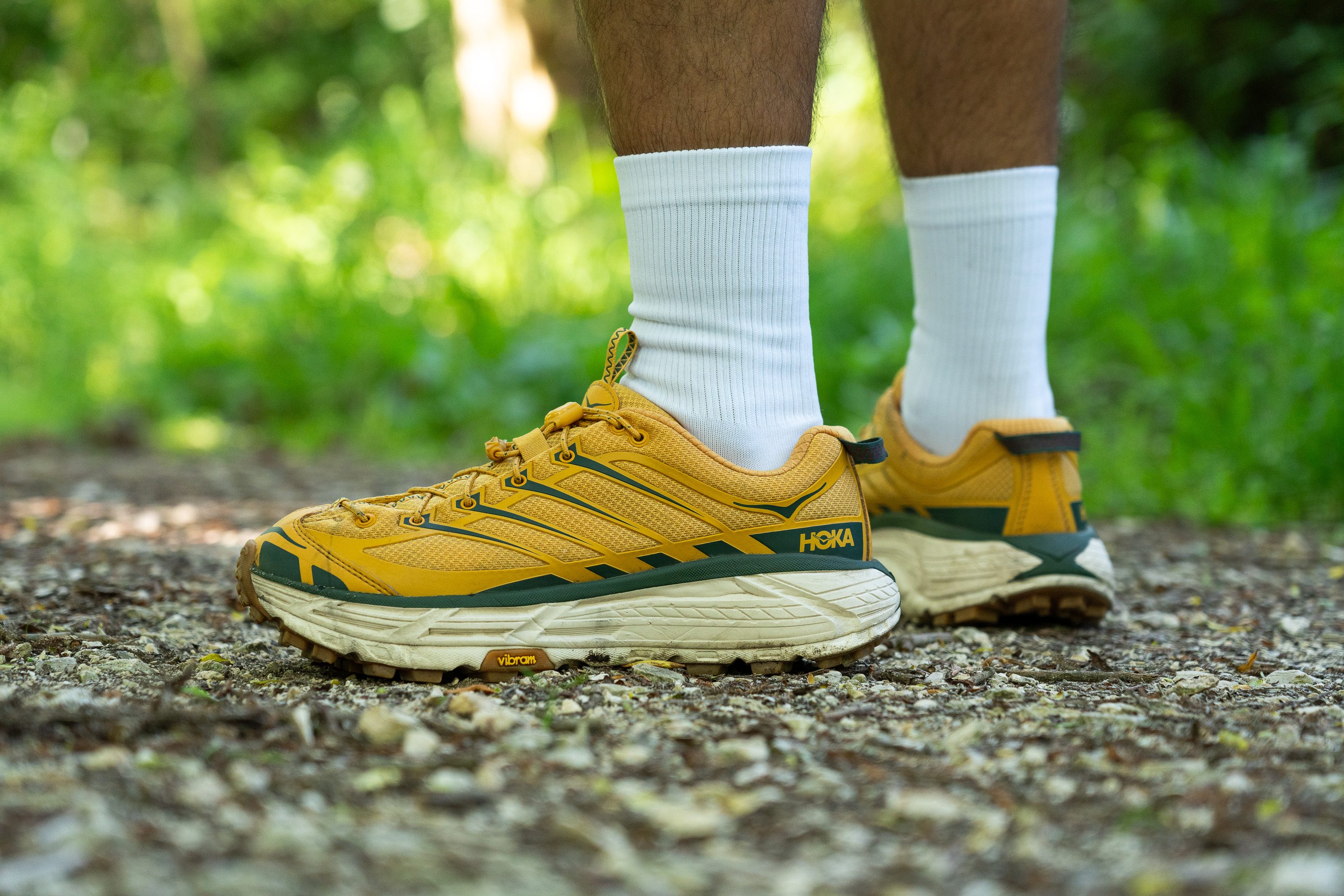
Who should NOT buy
We've found the Hoka Mafate Three2 carries some deal-breaking features. Its substantial weight could turn away many runners, so for those seeking a similar cushioned ride with a low drop, we recommend the Mafate Speed 4—overall, a lighter and more agile choice for running.
Moreover, we believe this shoe is too narrow for most, limiting its appeal. If you're looking for a roomier trail shoe with a low-drop configuration, we suggest checking out the Altra Lone Peak 8, which offers a more accommodating fit and a 0-mm offset.
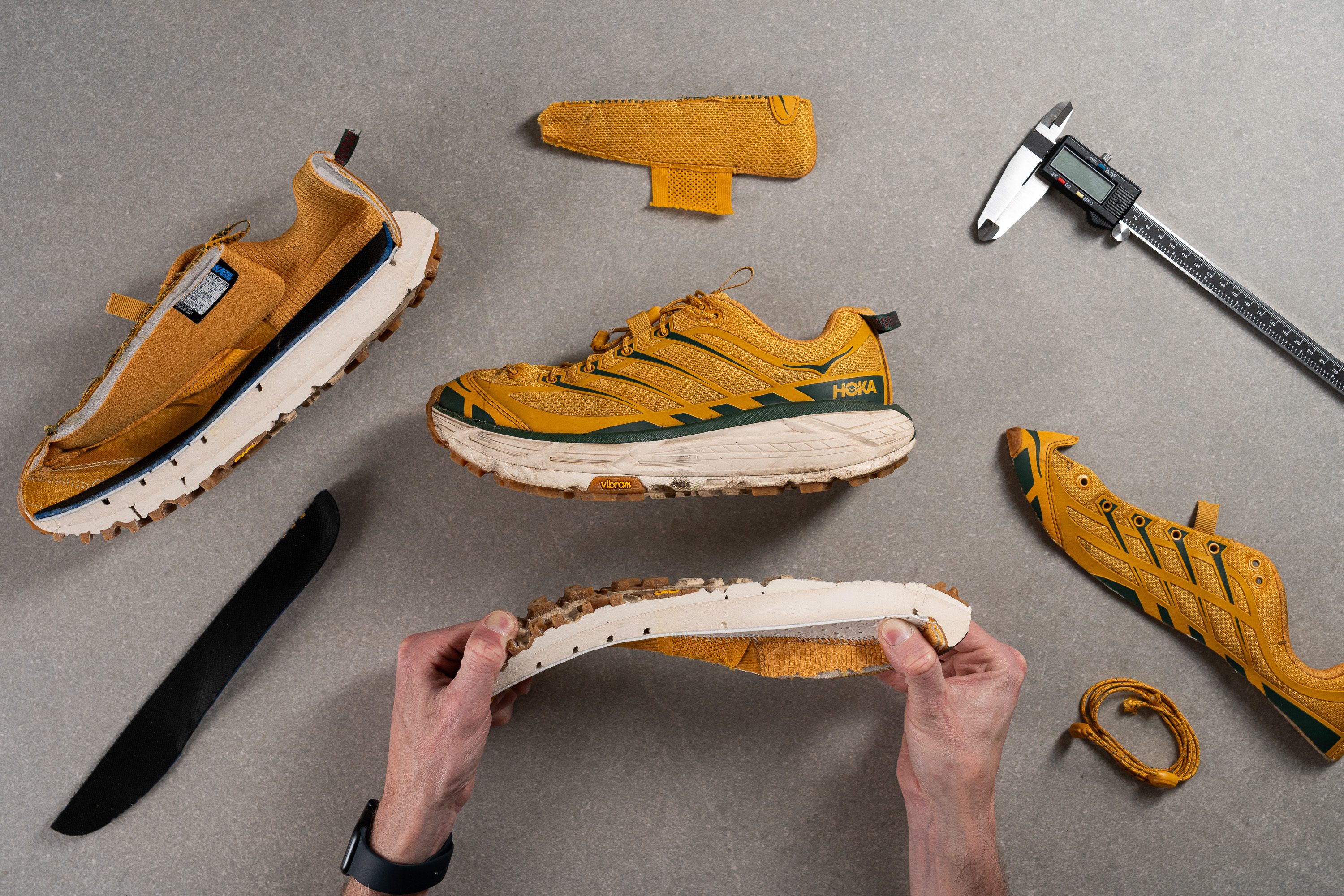
Cushioning
Heel stack
The tank-like appearance of the Mafate Three2 stems partly from its substantial stack height, which is distinctly designed for a maximalist approach.
We measured it precisely at 35.6 mm.
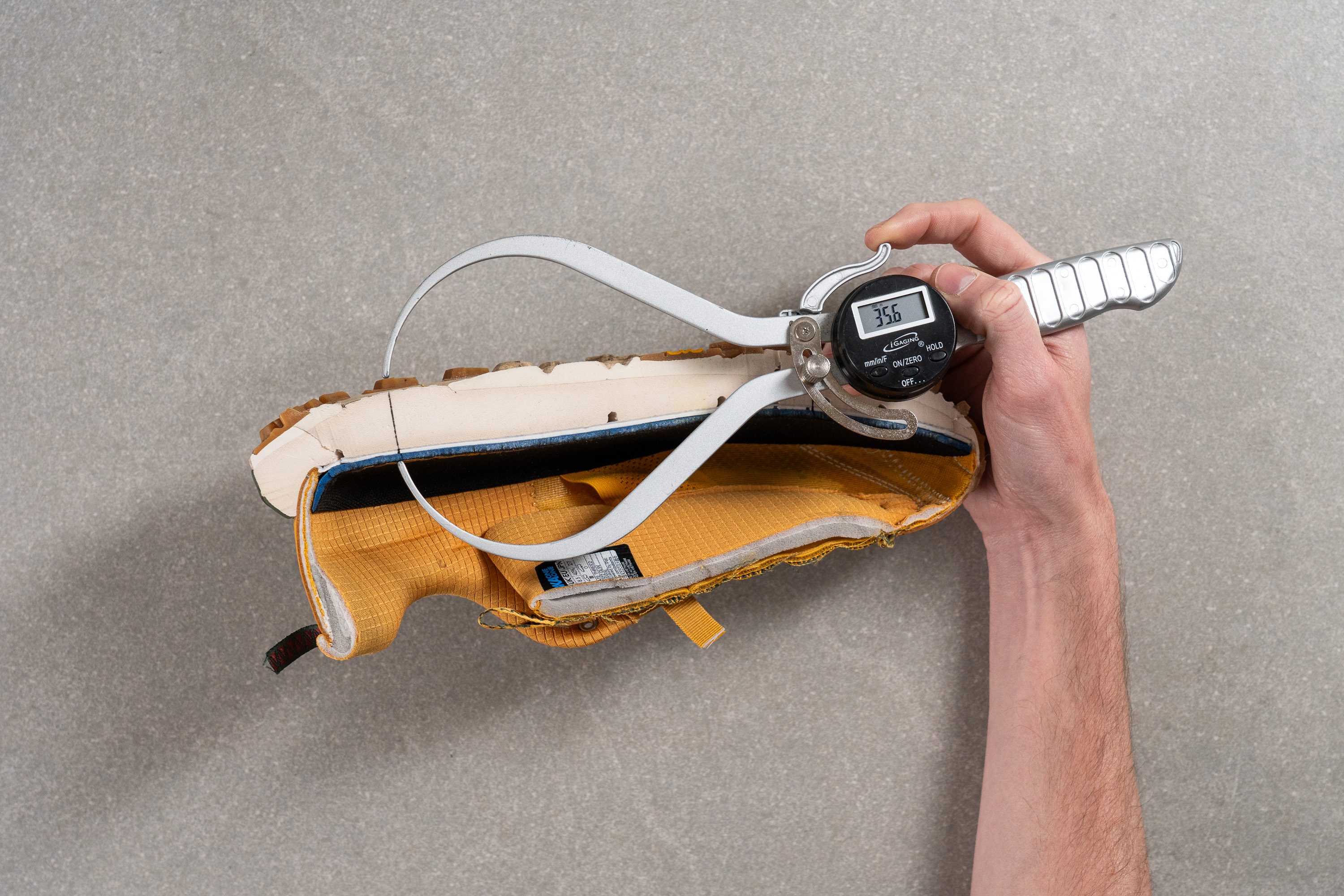
| Hoka Mafate Three2 | 35.6 mm |
| Average | 32.6 mm |
Forefoot stack
The forefoot is also notably tall, exceeding the 30-mm mark at 31.7 mm.
This ensures tonnes of foam underfoot, whether you strike the ground with your forefoot, midfoot, or heel, covering all bases for cushioning.
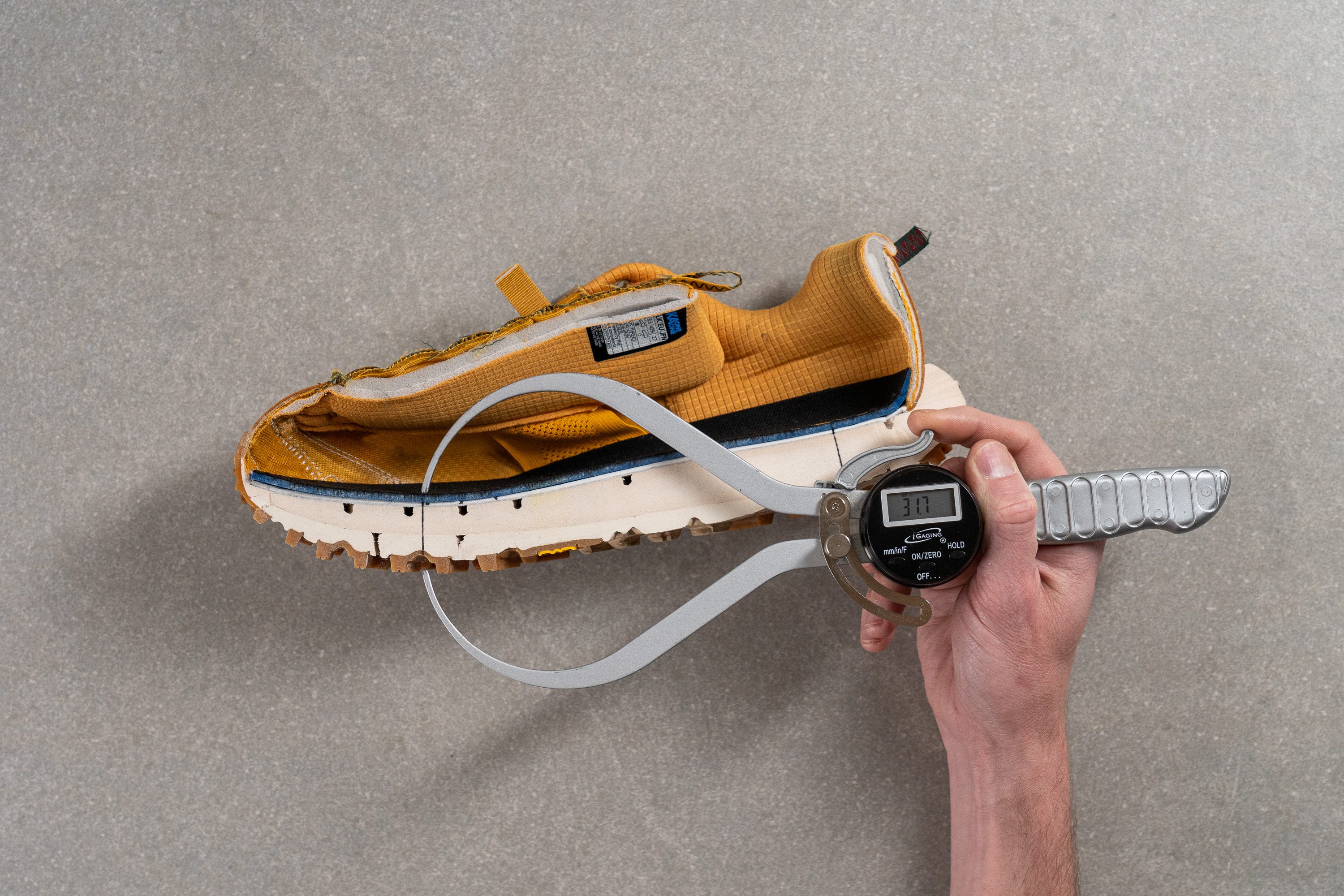
| Hoka Mafate Three2 | 31.7 mm |
| Average | 25.1 mm |
Drop
Hoka advertises a 4-mm drop, and we were delighted to measure an actual drop of 3.9 mm. Typically, we see over 50% discrepancies in Hoka shoes, so discovering such precise accuracy with only a 0.1 mm deviation in the lab was amazing!
This minimal drop suggests the shoe is especially suitable for midfoot and forefoot strikers, or anyone who prefers running in low-drop shoes. Additionally, it serves as an excellent transitional option for those aiming to eventually switch to zero-drop footwear.
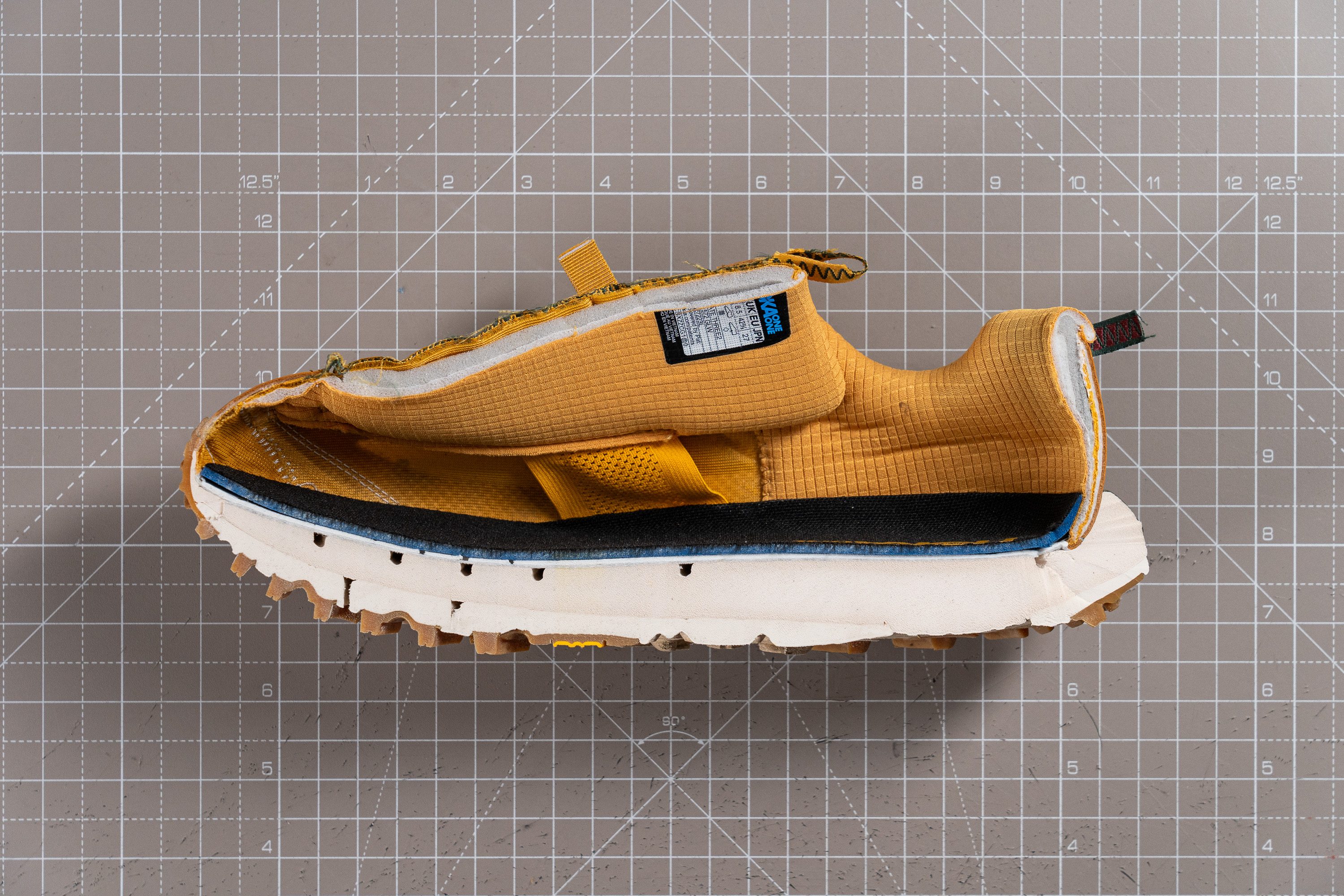
| Hoka Mafate Three2 | 3.9 mm |
| Average | 7.6 mm |
Midsole softness
From the outside, the Mafate Three2 appears to feature only one type of foam. However, slicing the shoe in half reveals the real story—we discovered two distinctly different EVA-based foams in the midsole.
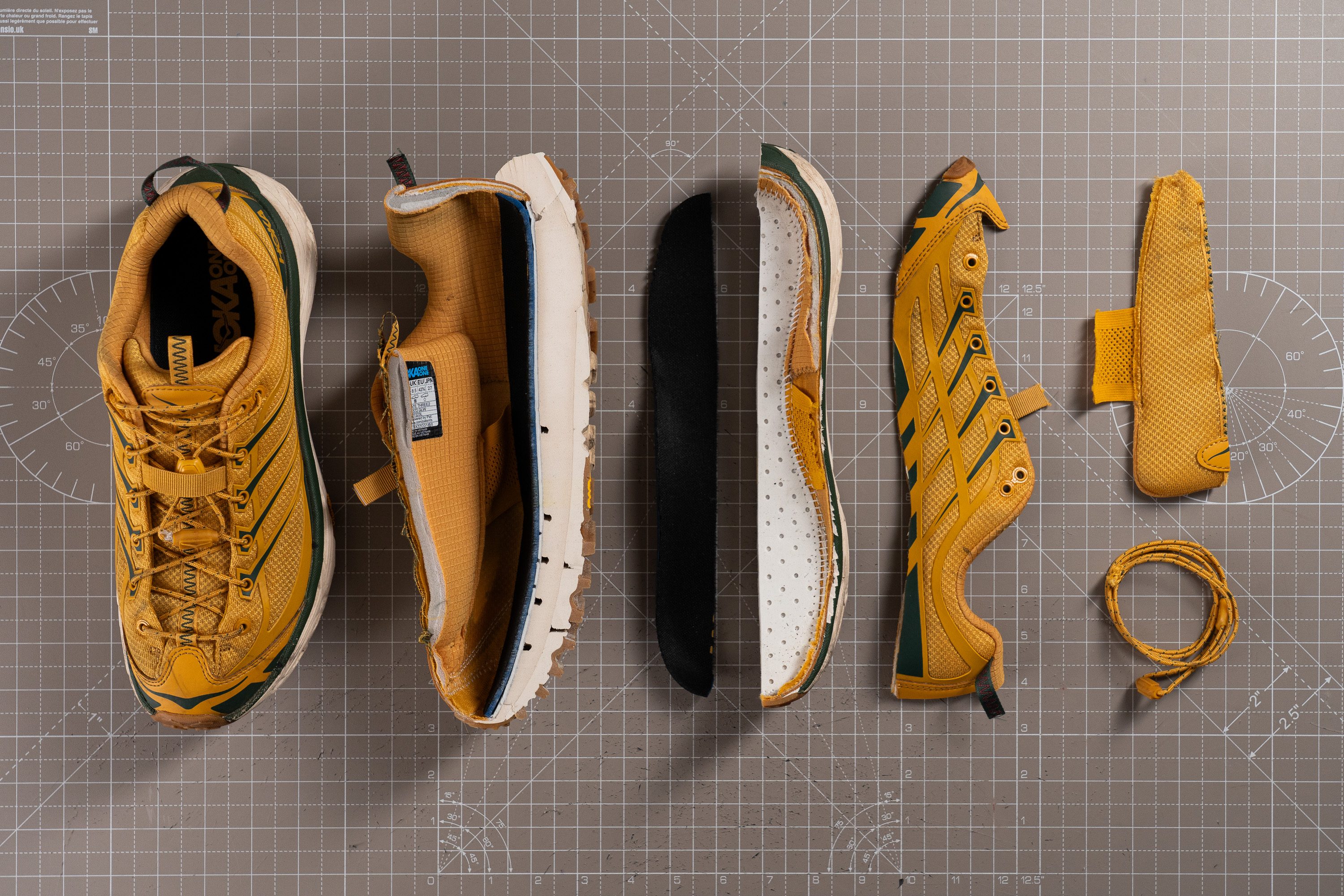
The primary, darker foam sits beneath the insole and registers a very soft 14.0 HA on our Shore A Durometer. This layer provides the substantial softness that characterises the shoe's feel while running.
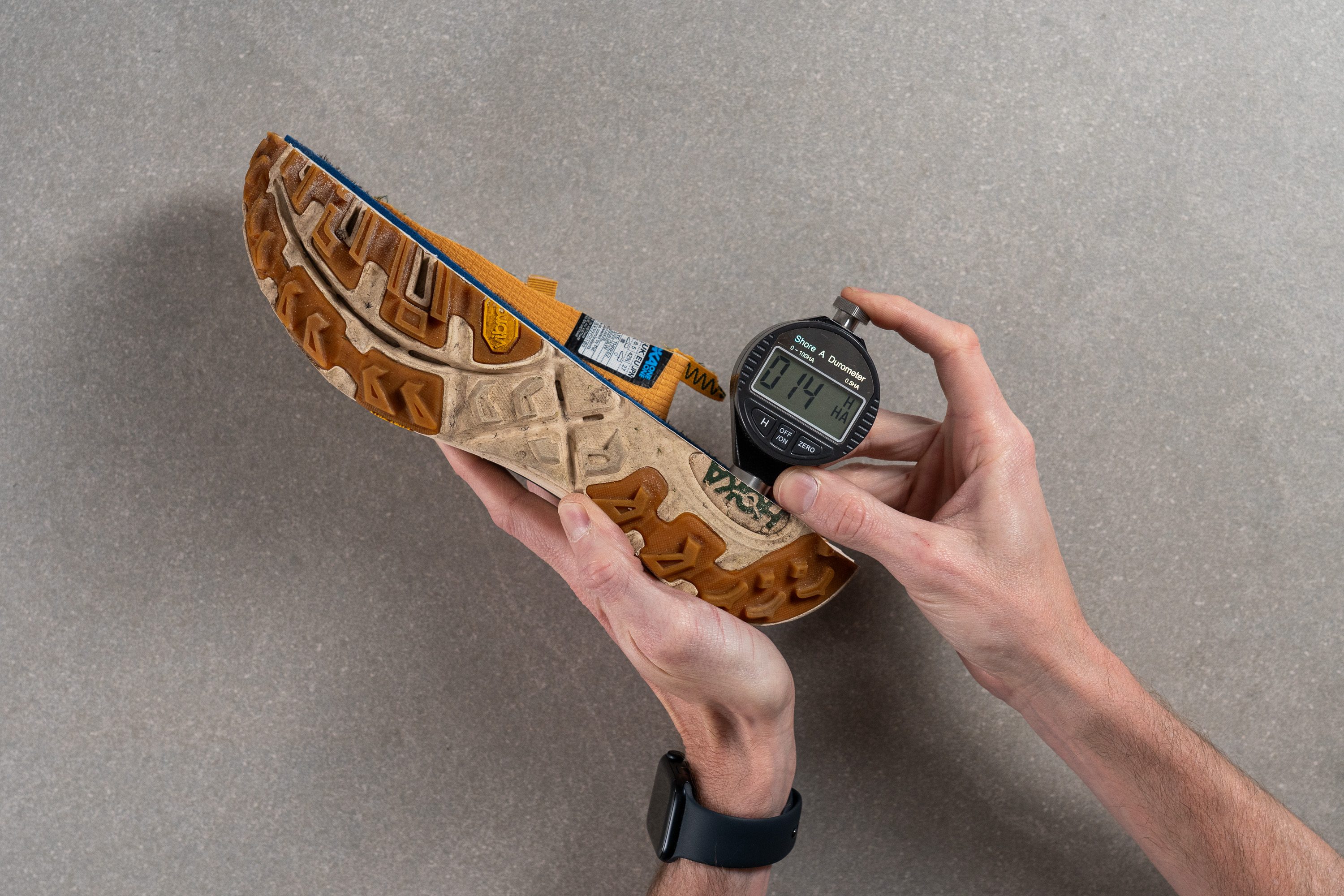
| Hoka Mafate Three2 | 14.0 HA |
| Average | 22.0 HA |
Secondary foam softness
Beneath the primary foam lies a secondary layer that's more than twice as firm as the main foam, with a hardness of 31.0 HA, enhancing both stability and durability.
This is crucial because the shoe lacks a rock plate, relying instead on the combination of lugs, outsole, and midsole for protection.
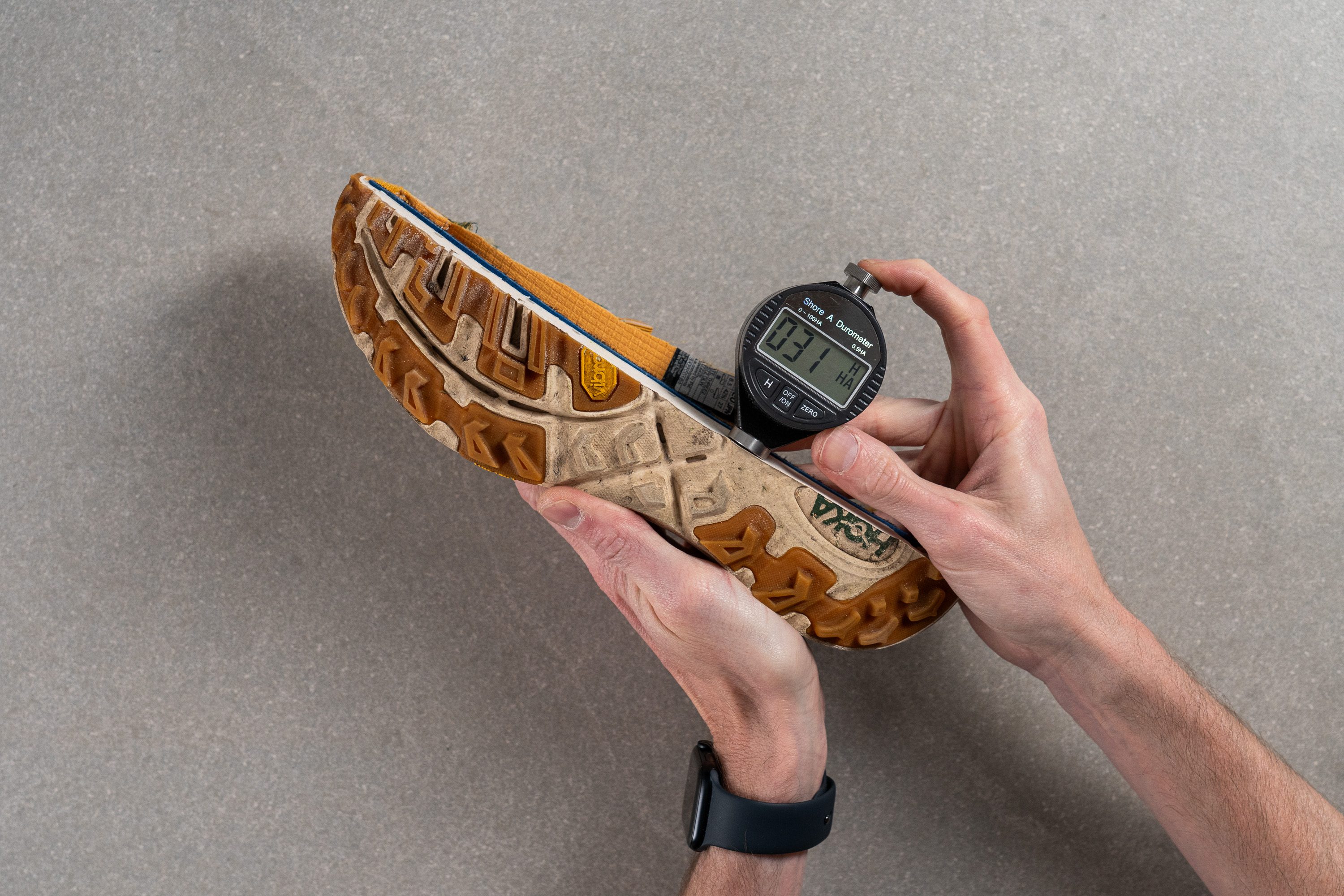
| Hoka Mafate Three2 | 31.0 HA |
| Average | 25.3 HA |
Size and fit
Size
Hoka Mafate Three2 fits slightly small (18 votes).
Internal length
| Hoka Mafate Three2 | 267.9 mm |
| Average | 269.0 mm |
Width / Fit
The shoe appears big and bulky, yet surprisingly, it doesn't offer much room inside. We initially noticed this just by trying it on, but decided to quantify our findings.
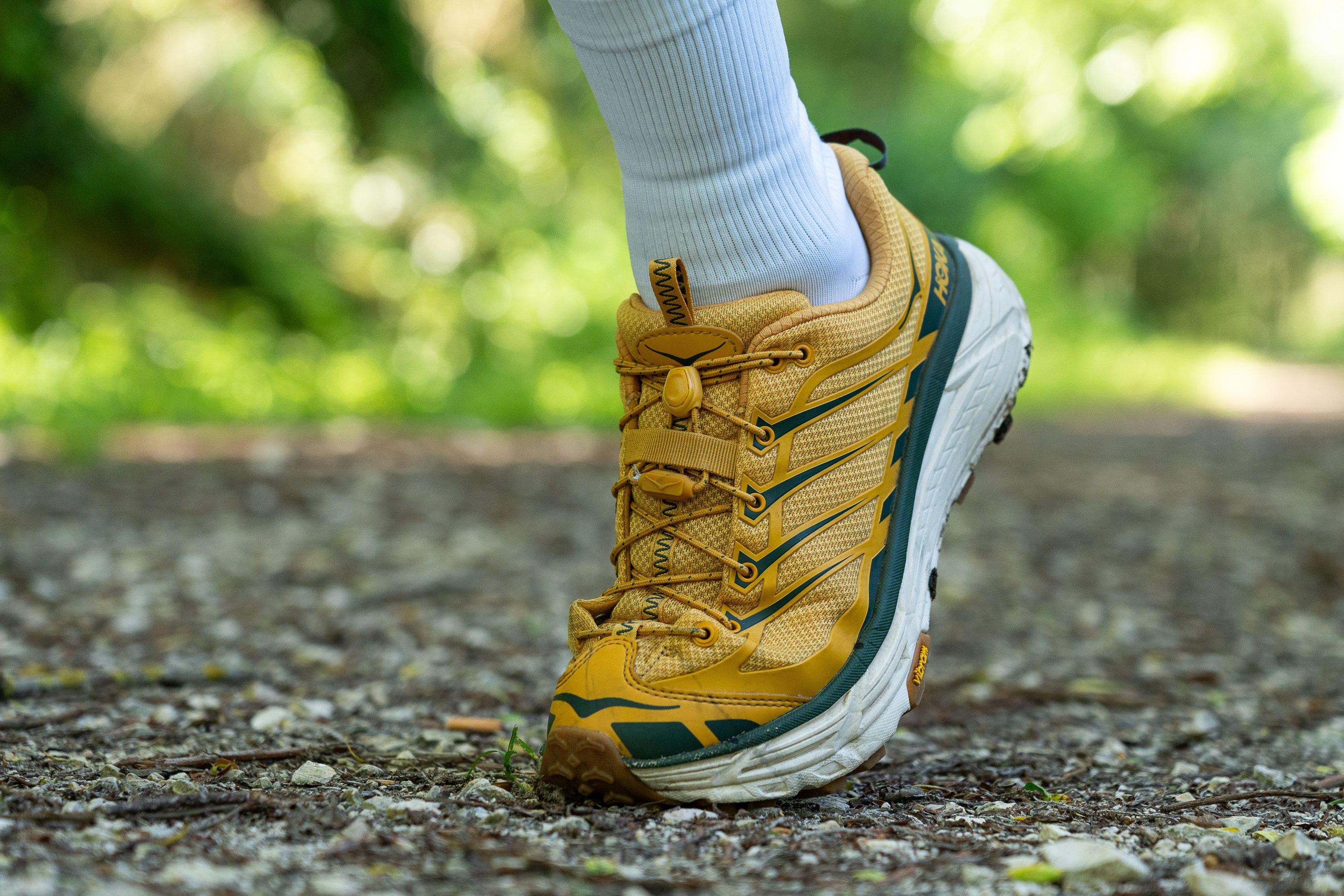
When we measured the widest part of the upper with digital callipers, we recorded a snug 96.7 mm. This confirms the tight fit despite the shoe's large exterior.
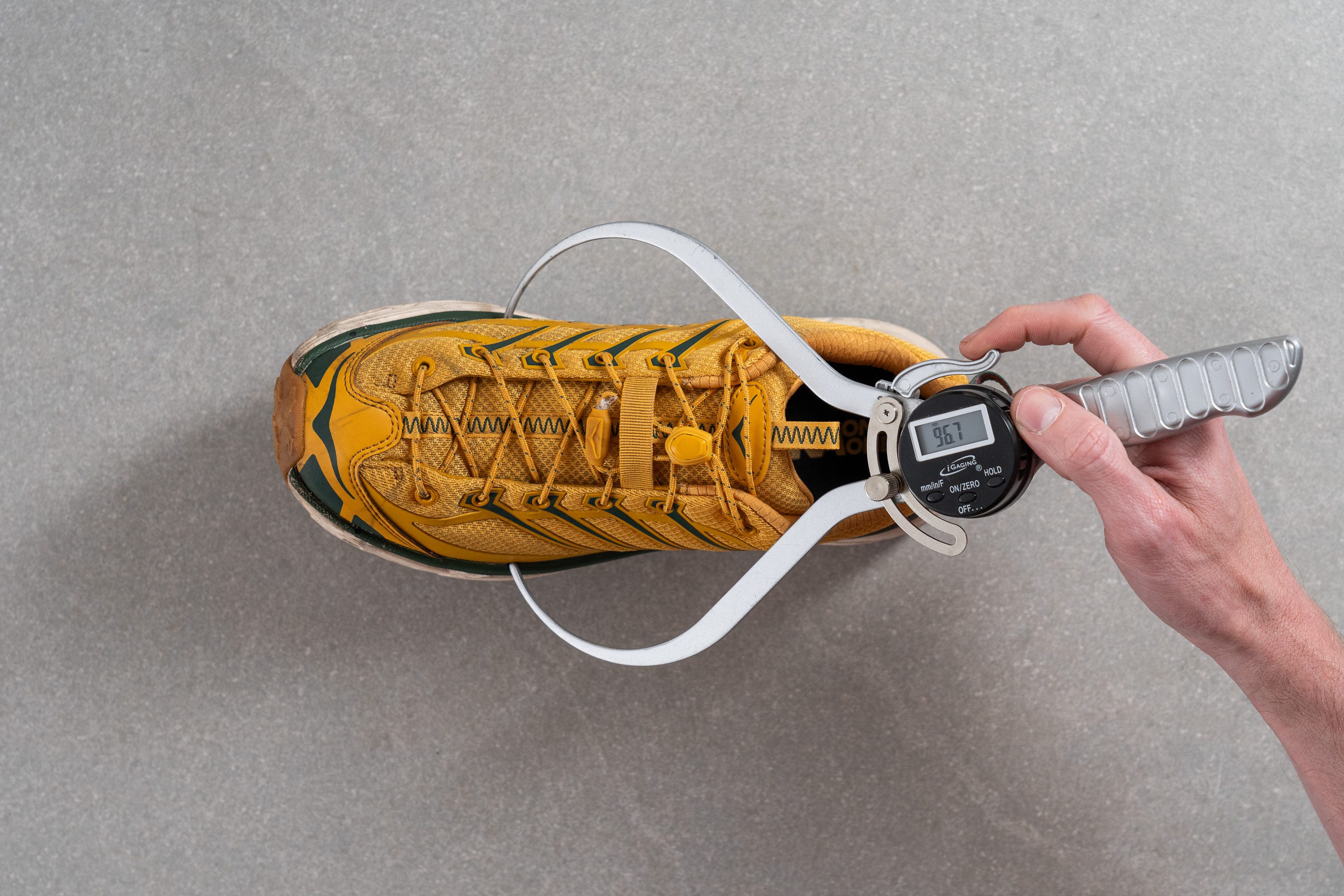
This test follows an older methodology, which is why you don't see recently tested shoes in the chart. Results from different methodologies can not be compared.
| Hoka Mafate Three2 | 96.7 mm |
| Average | 98.9 mm |
Toebox width
We took a second measurement in the big toe area, where the tight fit became even more apparent.
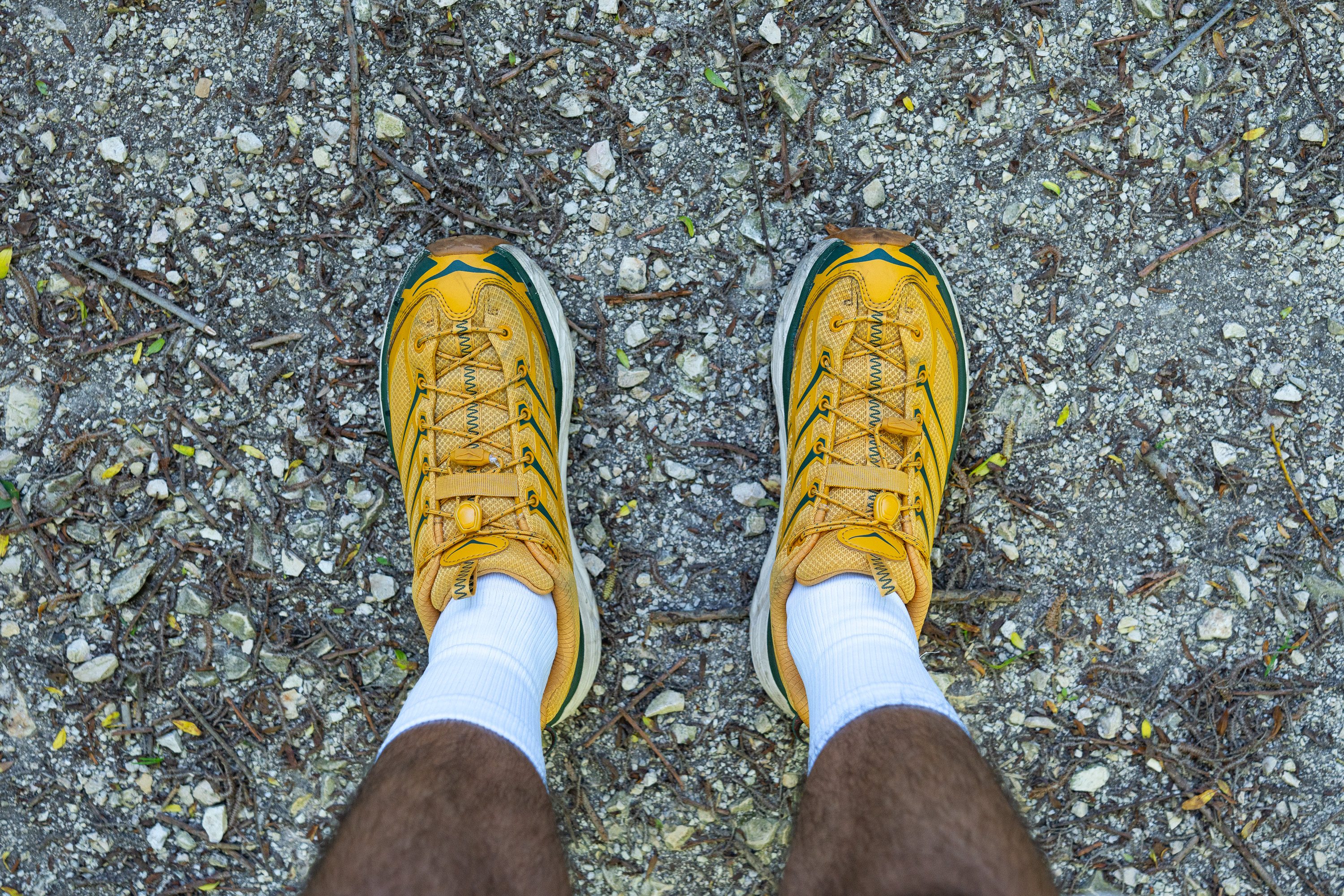
Measuring just 73.7 mm, this shoe provides the classic Hoka fit, which may feel uncomfortable for those with wide or square-shaped feet.
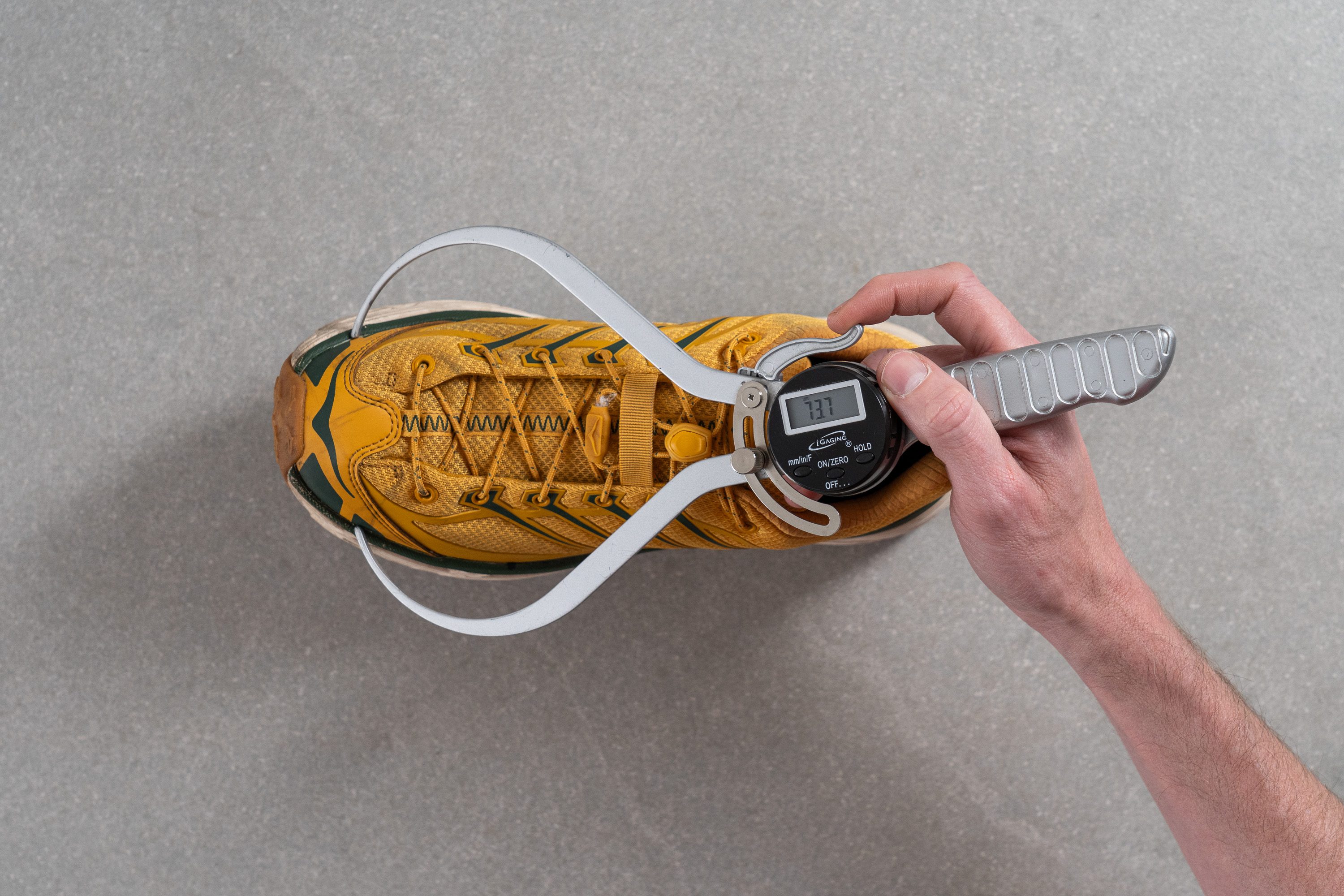
This test follows an older methodology, which is why you don't see recently tested shoes in the chart. Results from different methodologies can not be compared.
| Hoka Mafate Three2 | 73.7 mm |
| Average | 79.3 mm |
Traction / Grip
Lug depth
The 4.0-mm lugs on the Mafate Three2 are designed to perform well in various conditions, whether the terrain is dry or wet, loose or firm. However, they may not excel in any particular scenario.
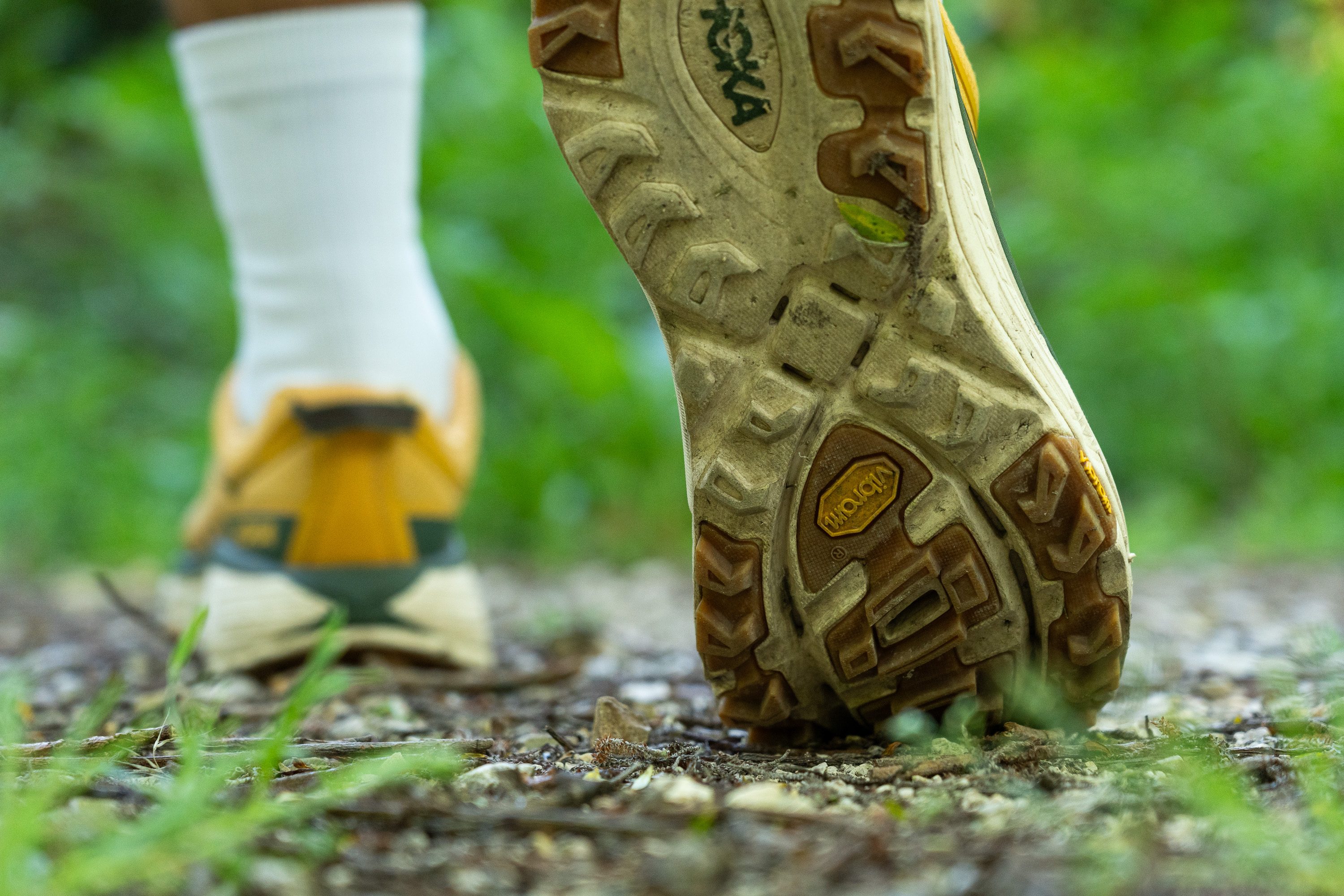
The lugs are patterned differently and oriented forwards or backwards depending on their position, enhancing their versatility.
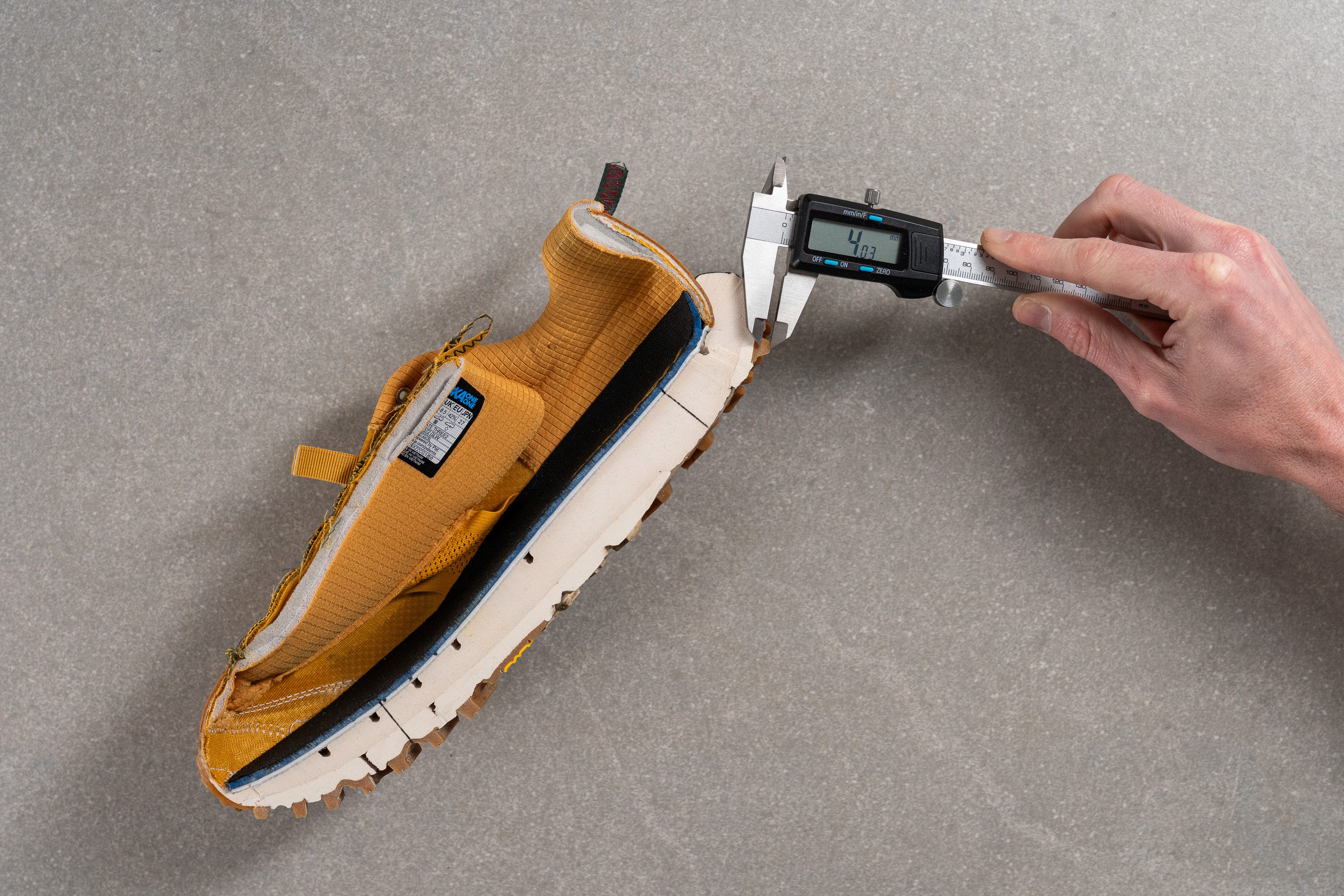
| Hoka Mafate Three2 | 4.0 mm |
| Average | 3.5 mm |
Flexibility / Stiffness
In our 90-degree test, registering at 32.2N, we found that the Three2 maintains a very balanced level of stiffness—it's not overly stiff like a carbon-plated shoe despite being very rigid.
This flexibility is ideal for a shoe designed for versatility, being suitable not only for running but also for walking and casual wear.
This test follows an older methodology, which is why you don't see recently tested shoes in the chart. Results from different methodologies can not be compared.
| Hoka Mafate Three2 | 32.2N |
| Average | 27.1N |
Stiffness in cold (%)
To assess how the shoe's stiffness might vary in cold conditions, we chilled it in the freezer for 20 minutes before testing again.
Using the force gauge for the second time, we observed a stiffness increase of 28.5%, which is reasonably acceptable under such temperature changes.
| Hoka Mafate Three2 | 29% |
| Average | 32% |
Weight
The Mafate Three2 has a bulky appearance—and indeed, it is quite hefty.
Weighing in at 11.7 oz or 332g, this hybrid shoe is clearly not designed for those who prefer a lightweight ride.
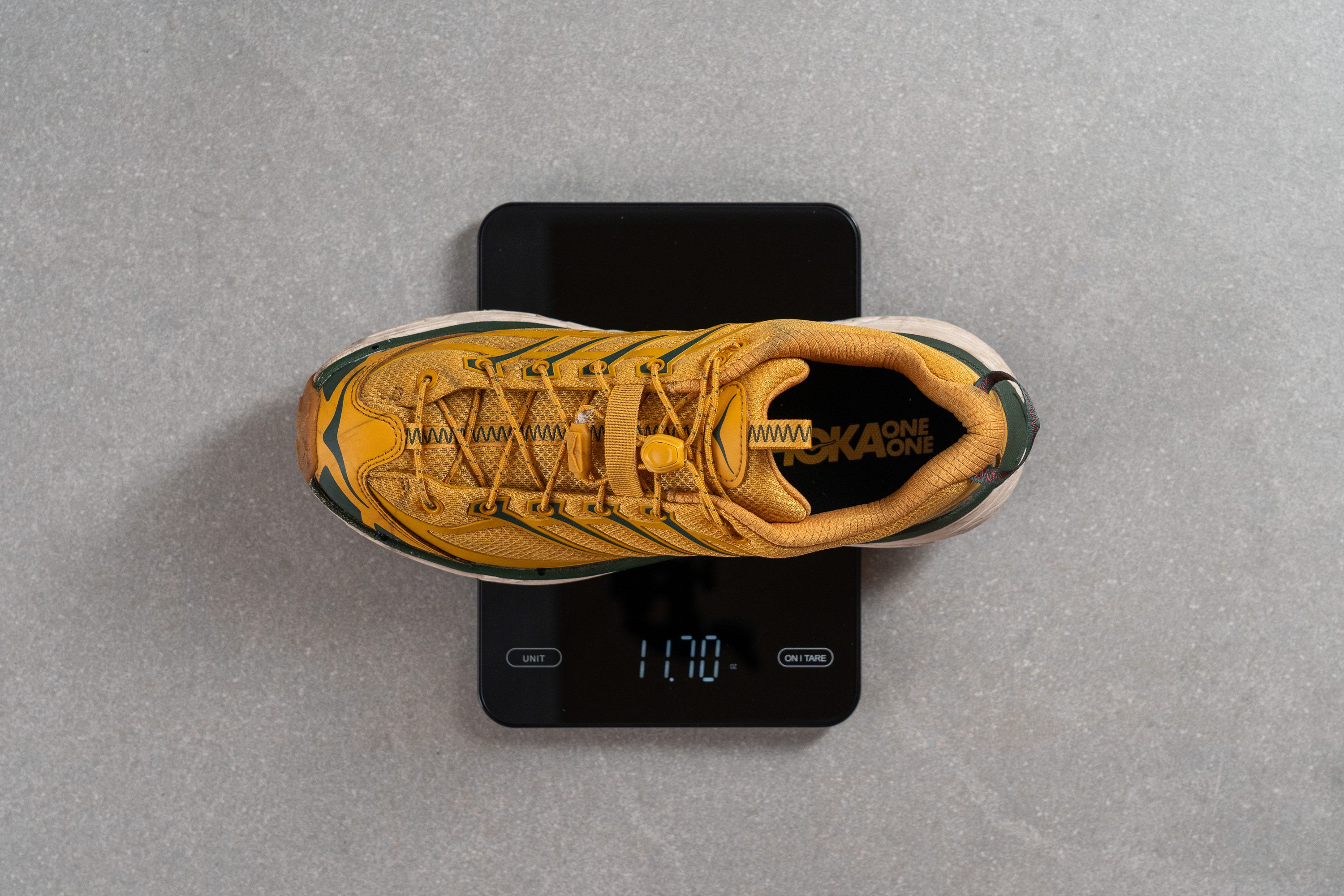
| Hoka Mafate Three2 | 11.7 oz (332g) |
| Average | 10.2 oz (289g) |
Breathability
In the lab, we often speculate about a shoe's breathability before testing (just for fun), and with the Three2, it felt like hitting the jackpot was just as unpredictable. We decided the only way to know was to dive into the tests.
We started with the smoke test—a pleasant surprise that demonstrated optimal ventilation, scoring the Three2 a 4 out of 5. This was an encouraging start, no more guessing needed.
Next, we examined the sliced shoe under the light, revealing an unusual combination of paper-thin mesh and incredibly thick reinforcements. This unique structure efficiently expels hot air, keeping the shoe breathable.
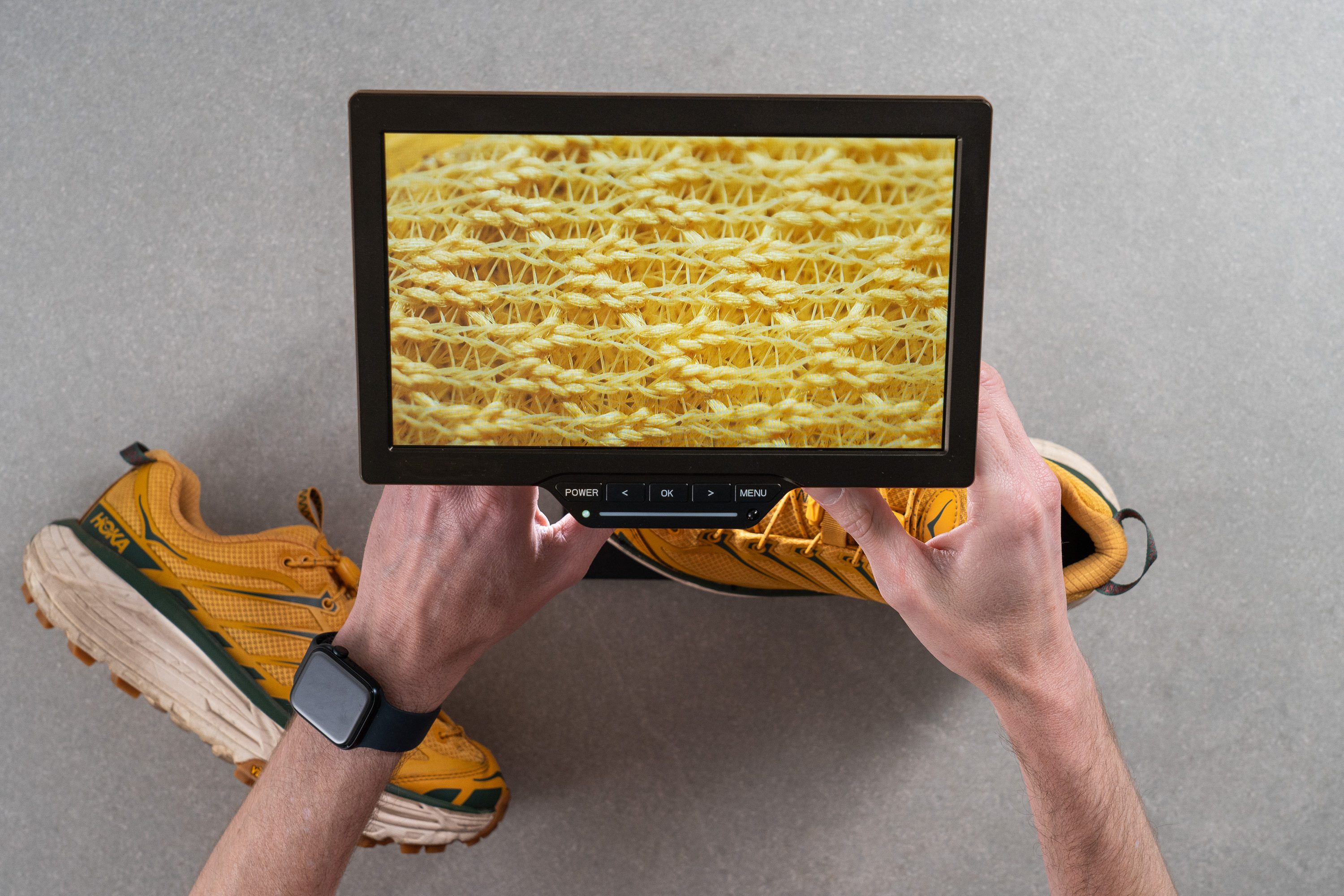
Using our microscope, we discovered that Hoka used a mesh that mixes different yarns, hinting at potentially impressive results in our upcoming durability test with the Dremel.
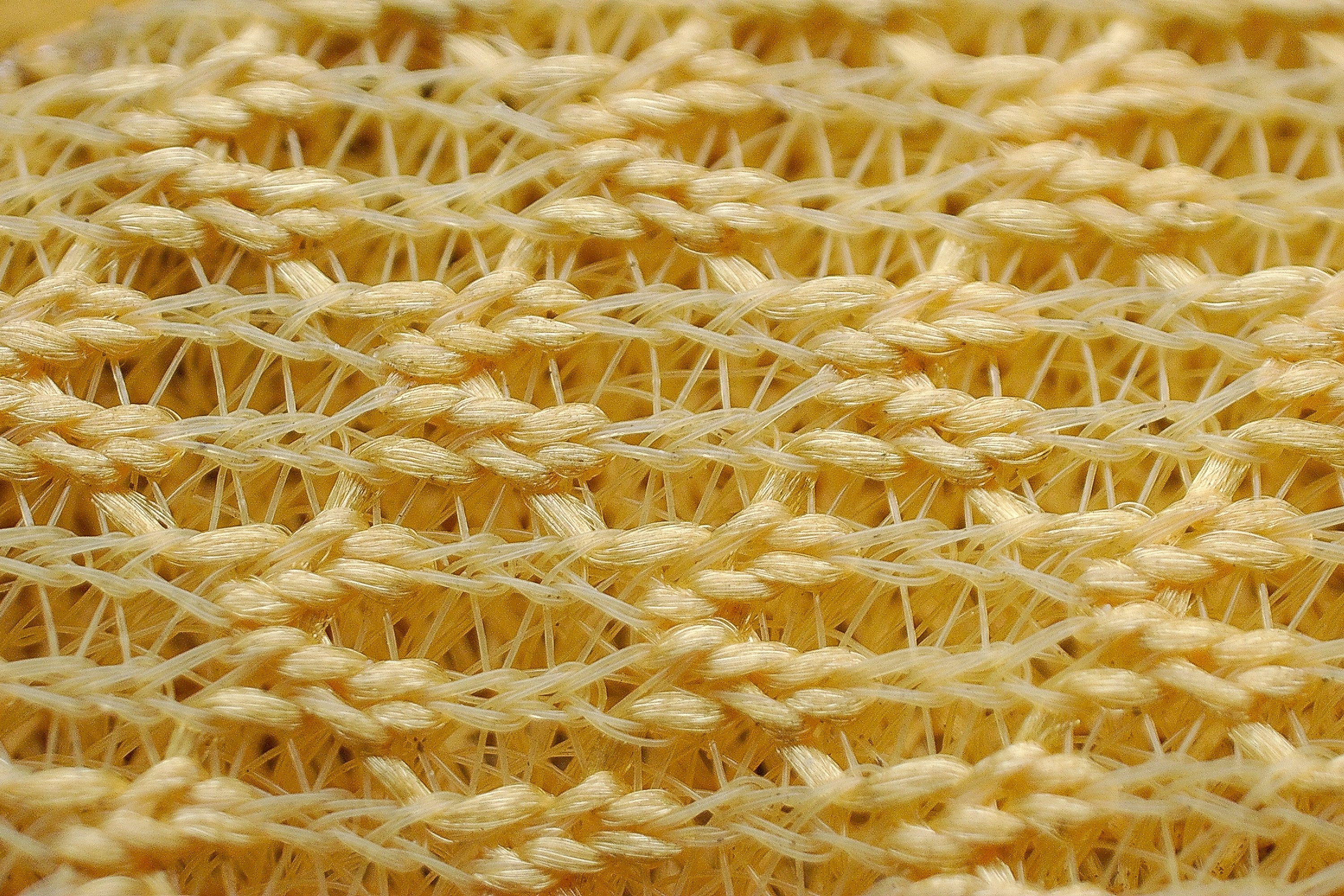
Finally, we assessed the upper by hand.
We can confirm it's exceptionally padded—easily one of the cushiest uppers we've encountered recently in the lab!
| Hoka Mafate Three2 | 4 |
| Average | 3.3 |
Stability
Lateral stability test
The Mafate Three2 is designed without any specific stability features, but it has large sidewalls that guide the foot and prevent lateral collapse, making it suitable for neutral runners or those with very mild stability needs.
Torsional rigidity
In our torsional rigidity test, we awarded the Mafate Three2 a 5/5, a rating typically seen in carbon-plated shoes like the Nike Ultrafly. Attempting to bend and twist this shoe simply requires extraordinary strength!
For those who prefer a natural, flexible ride, be aware that the Mafate Three2 offers the opposite. If that's a dealbreaker and you prefer a shoe with a thin midsole that bends like a yogi, the Trail Grove 7 from Merrell would be an ideal choice.
| Hoka Mafate Three2 | 5 |
| Average | 3.6 |
Heel counter stiffness
The heel counter is somewhat more flexible compared to the overall rigidity of the shoe, offering a more permissive and comfortable feel with a rating of 3/5, similar to that of a daily trainer.
| Hoka Mafate Three2 | 3 |
| Average | 3 |
Midsole width - forefoot
The Mafate Three2 appears bulky and cumbersome, yet it's surprisingly narrower than it looks. We measured its forefoot width at 114.4 mm.
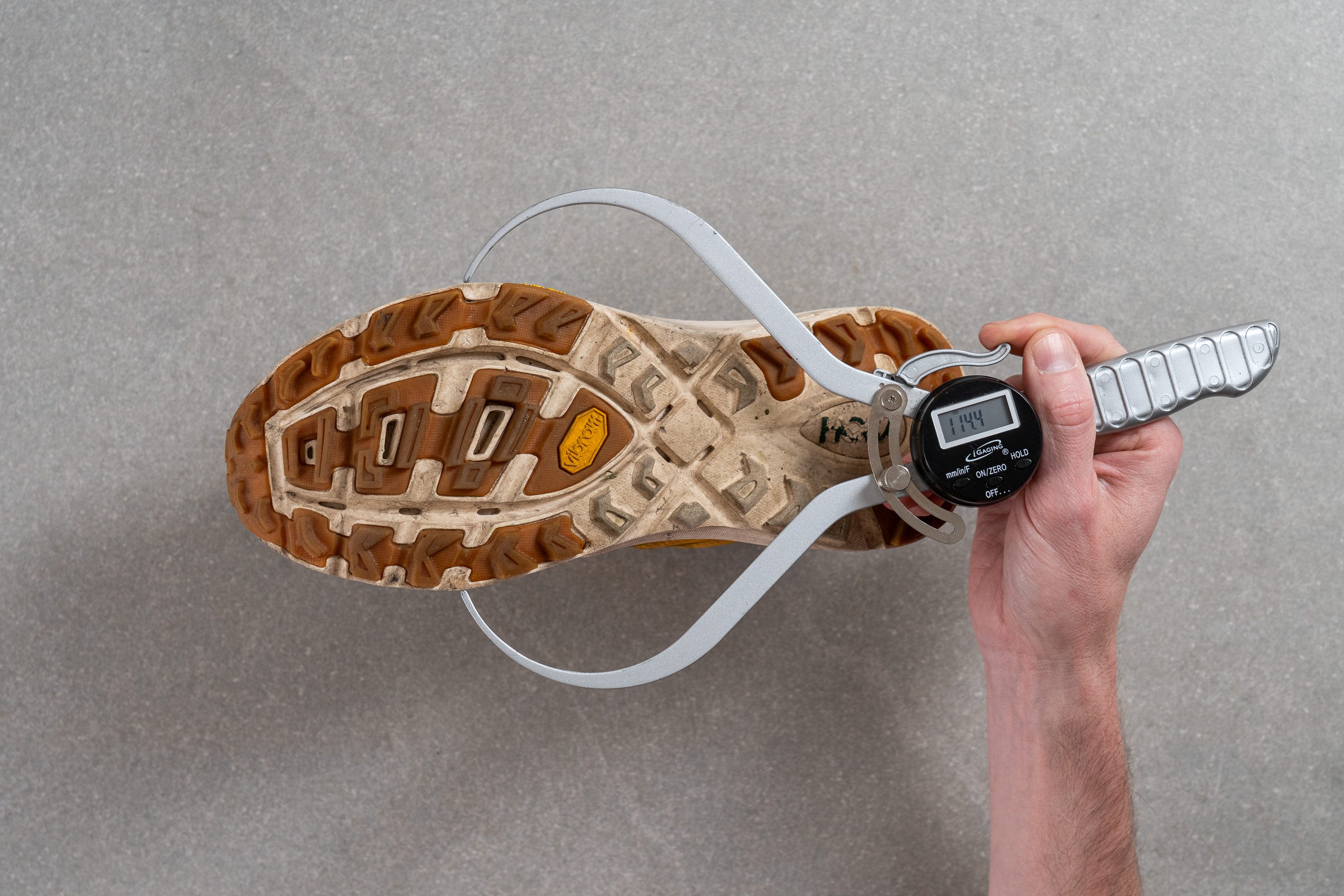
| Hoka Mafate Three2 | 114.4 mm |
| Average | 112.8 mm |
Midsole width - heel
We took a second measurement at the heel, which measured 95.7 mm—noticeably wider than most trail shoes.
This dimension also suggests that the shoe is quite suitable for running on flat or easy terrains. However, it may feel somewhat clunky on more complex, technical trails.
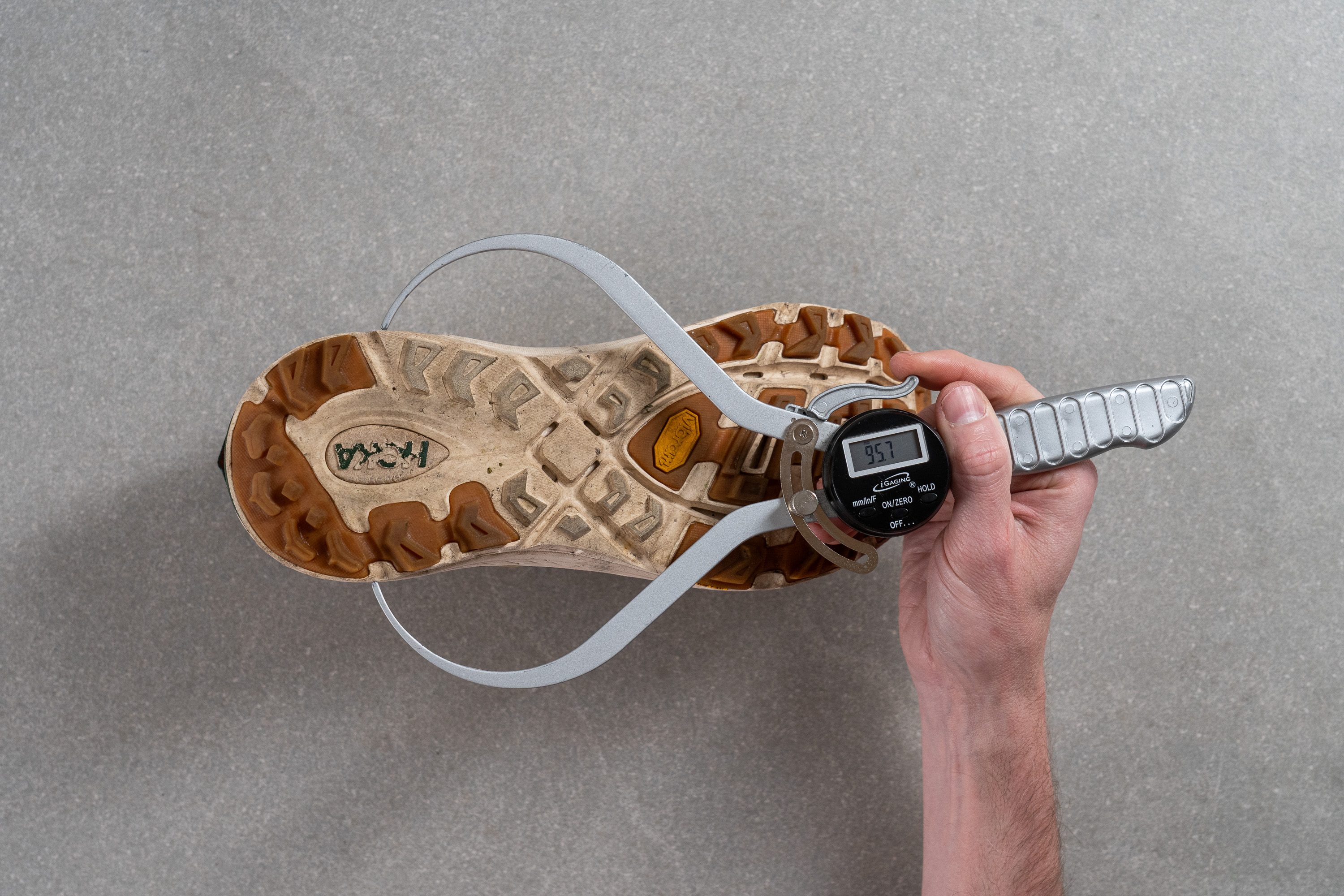
| Hoka Mafate Three2 | 95.7 mm |
| Average | 89.9 mm |
Durability
Toebox durability
The toe cap is excellently shielded with hot melt overlays, so we were quite optimistic about our Dremel test performance on this shoe.
After the Dremel completed its task in the toe guard, we found minimal damage and were thrilled to give this shoe a perfect score of 5/5.
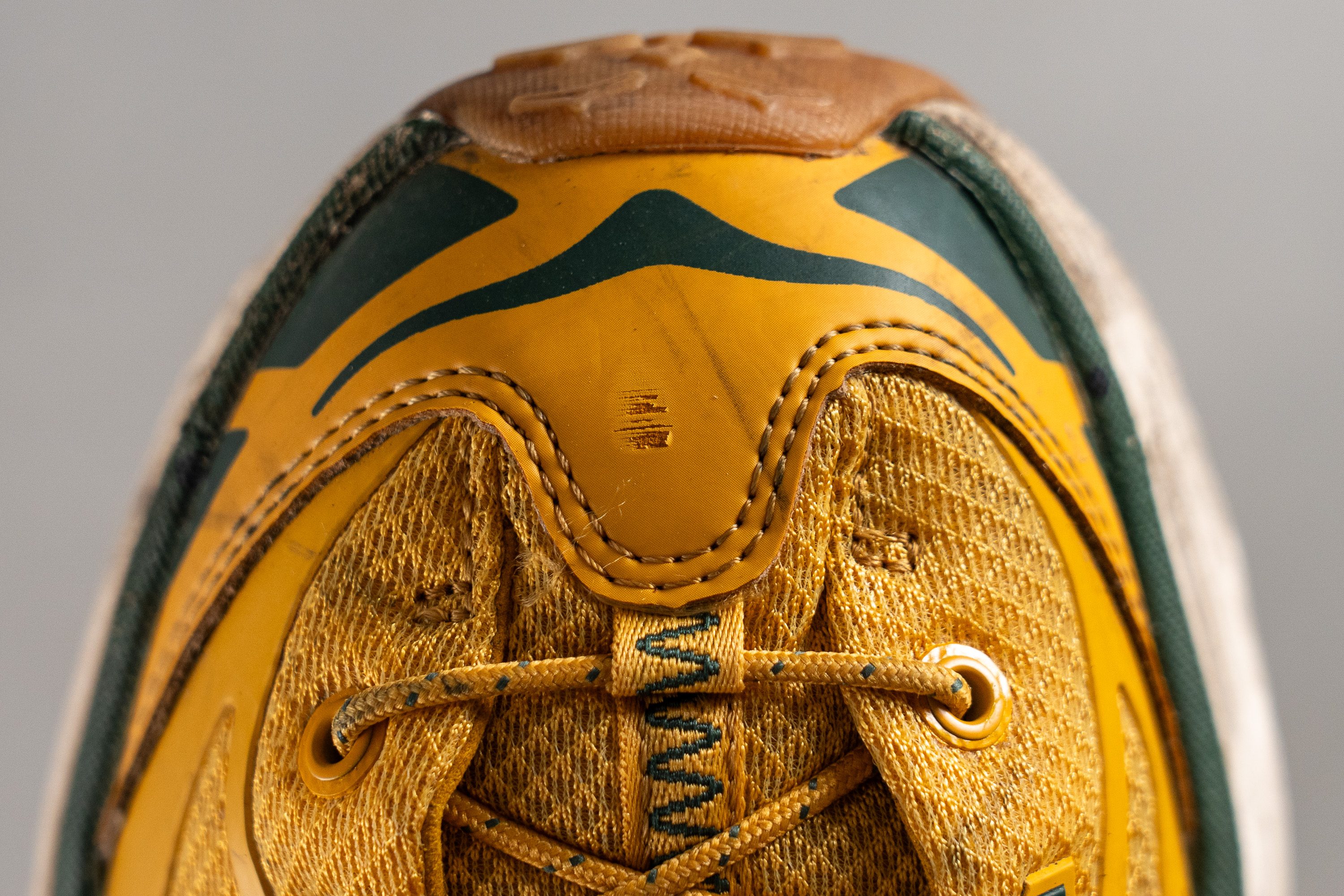
| Hoka Mafate Three2 | 5 |
| Average | 3.1 |
Heel padding durability
We then shifted our focus to the heel counter area for another Dremel test, using the exact same settings at 3.2N and 5K RPM.
The results were decent, scoring a 3/5, though not spectacular. You can't have it all—when a shoe prioritises pillow-like comfort in the heel, durability often takes a backseat.
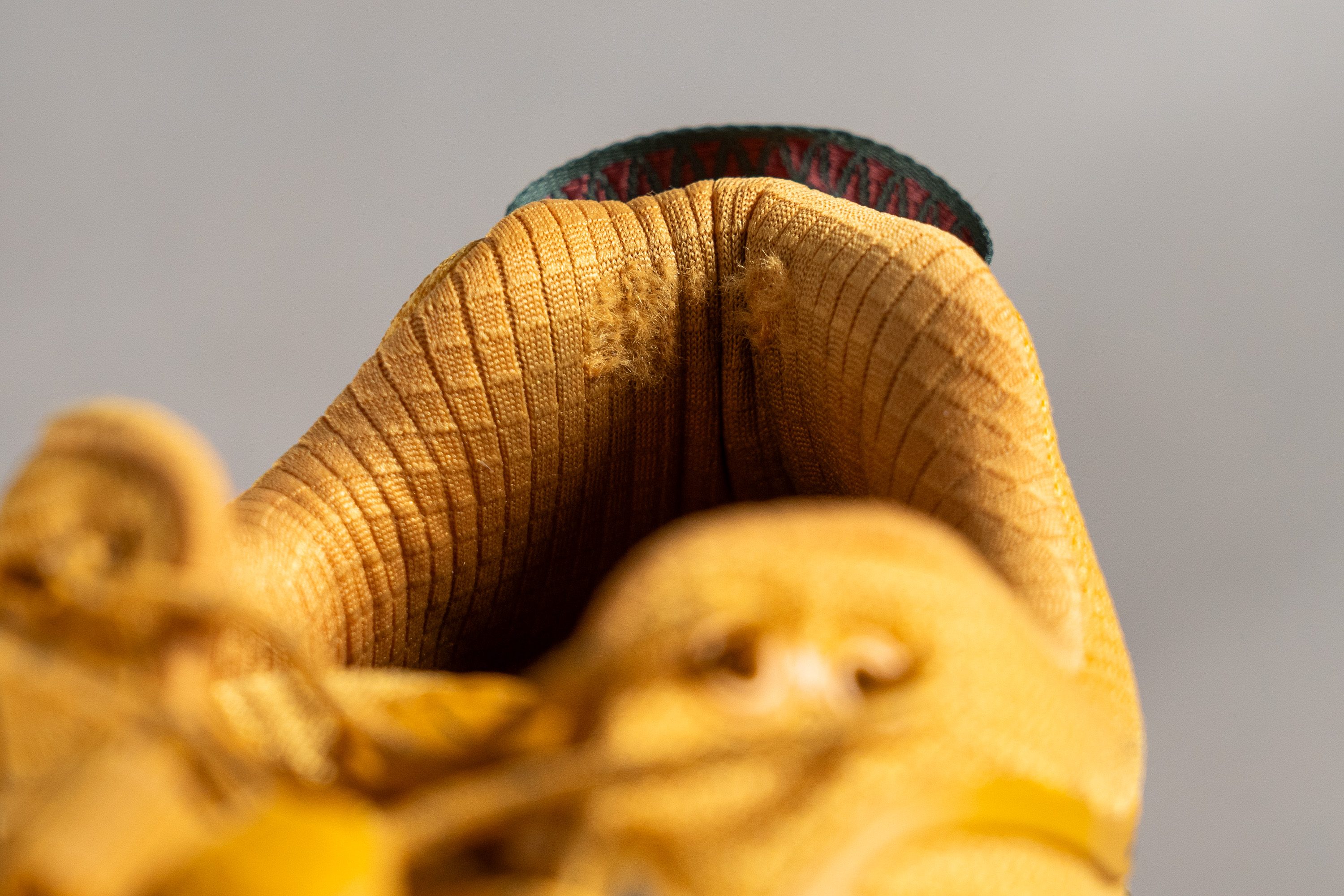
| Hoka Mafate Three2 | 3 |
| Average | 3 |
Outsole hardness
Moving to the outsole, we were excited to find that the Three2 features one of the best rubbers on the market—Vibram Megagrip.
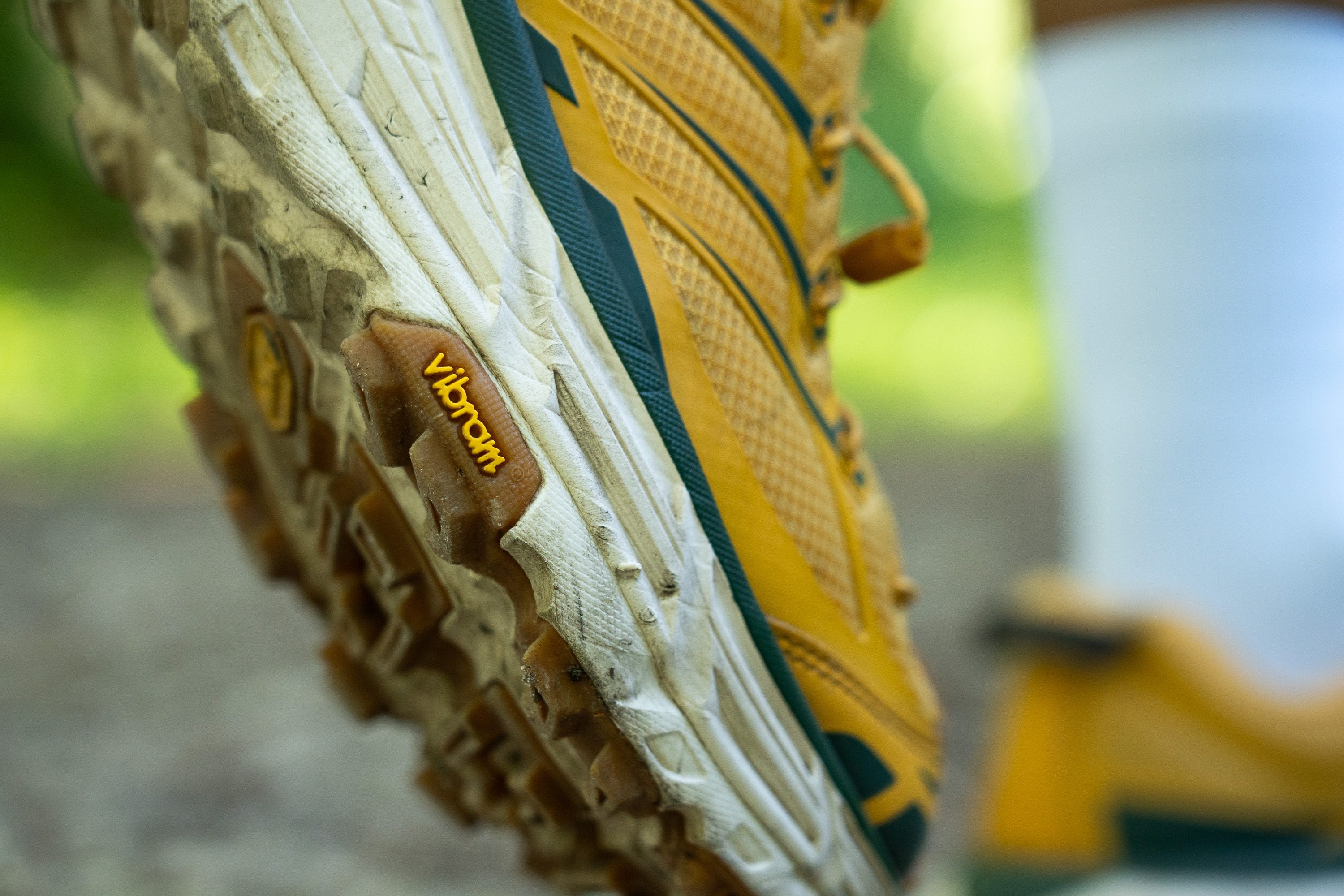
In our initial test, we recorded an 85.6 HC for the Italian rubber, a perfectly average result that aims to strike a balance between durability and grip.
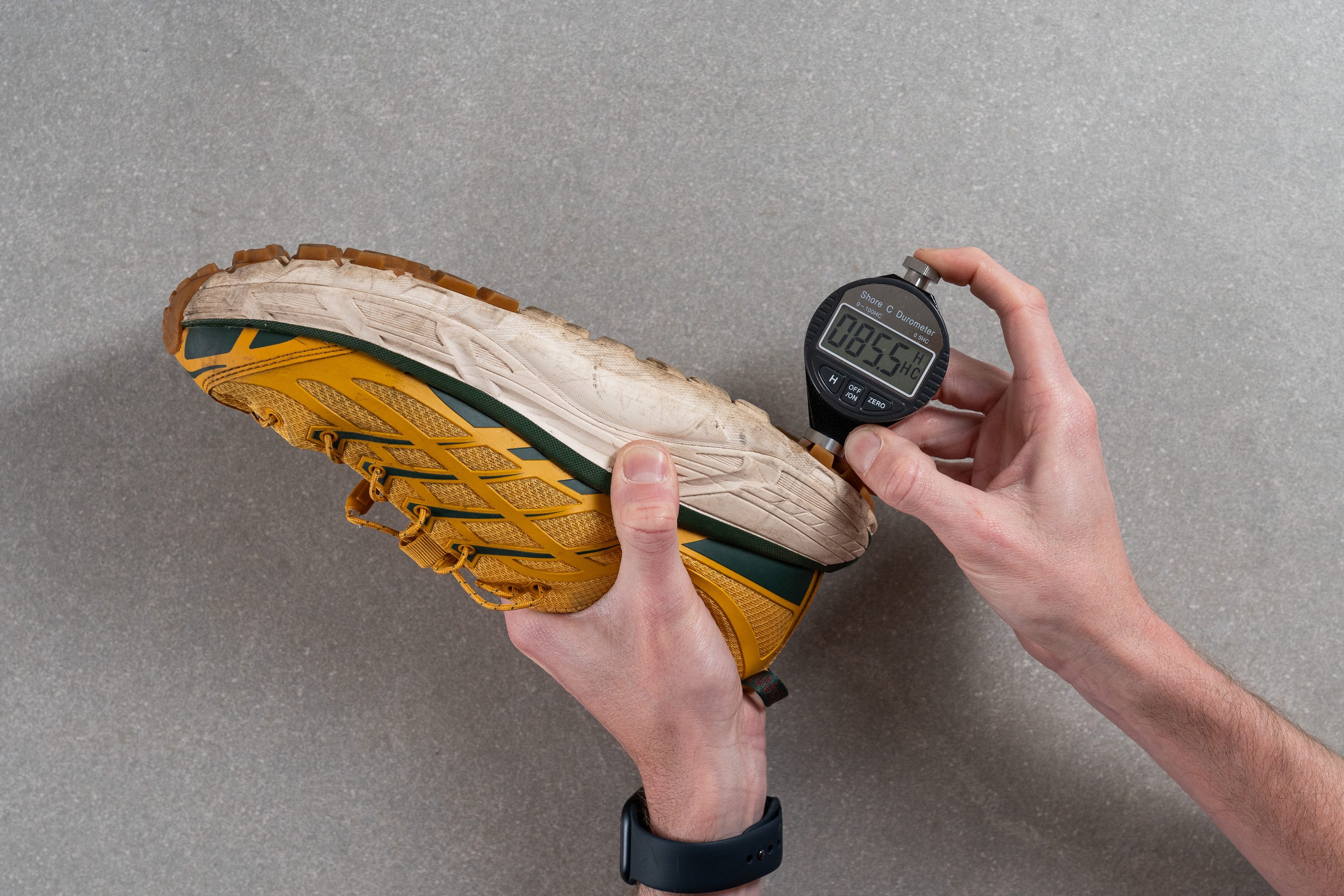
| Hoka Mafate Three2 | 85.6 HC |
| Average | 85.8 HC |
Outsole durability
The balanced results from our initial test suggested good durability, so we decided to up the ante. Our third and most intense Dremel test ramped up both speed and duration to really challenge the rubber.
After completing our tests, we found a mere 0.9-mm indentation in the Vibram rubber, which left us satisfied with its performance.
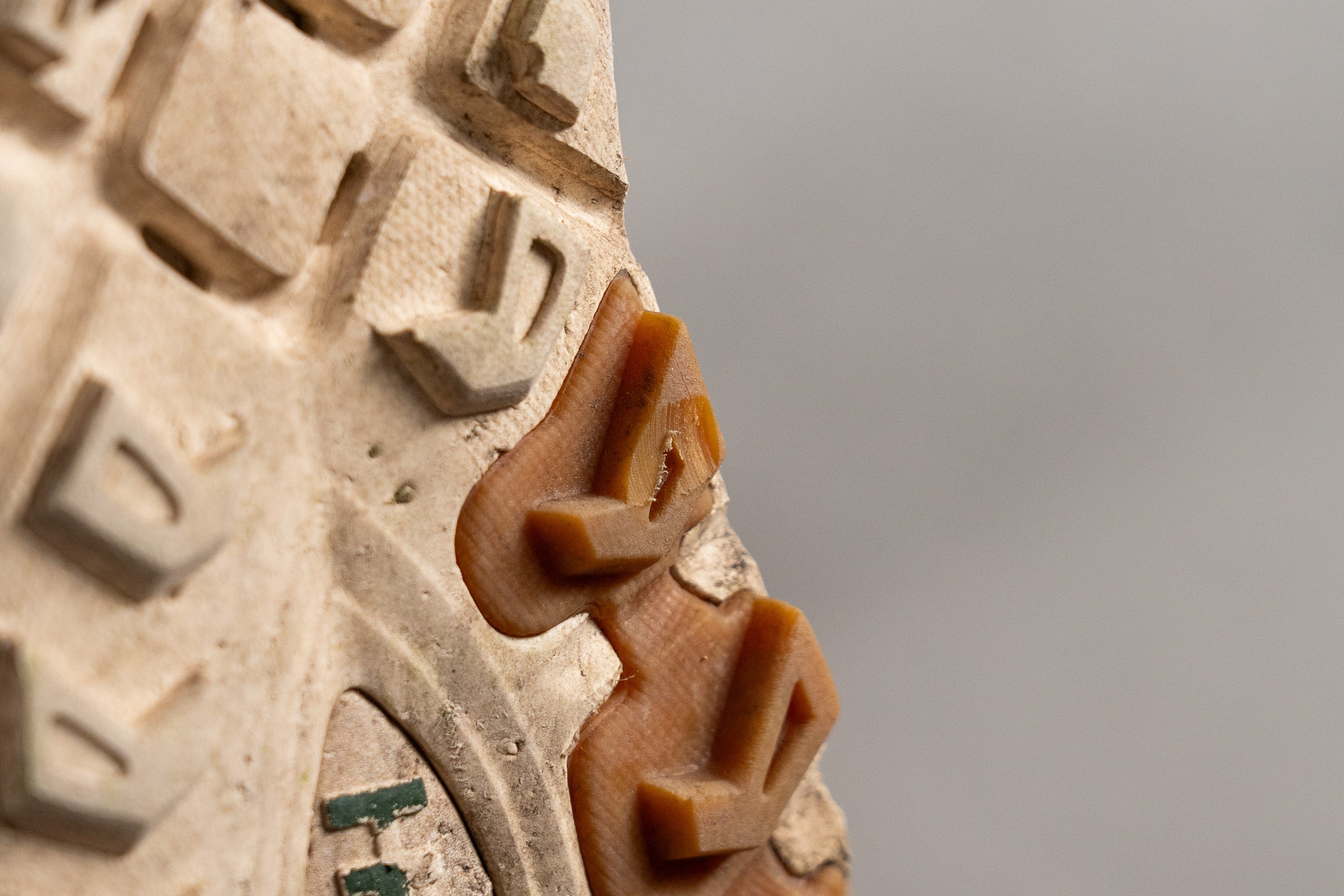
| Hoka Mafate Three2 | 0.9 mm |
| Average | 0.9 mm |
Outsole thickness
The outsole may not be very thick, but we believe it's the right design for this shoe, given its substantial lugs—which we'll discuss later—and satisfactory durability.
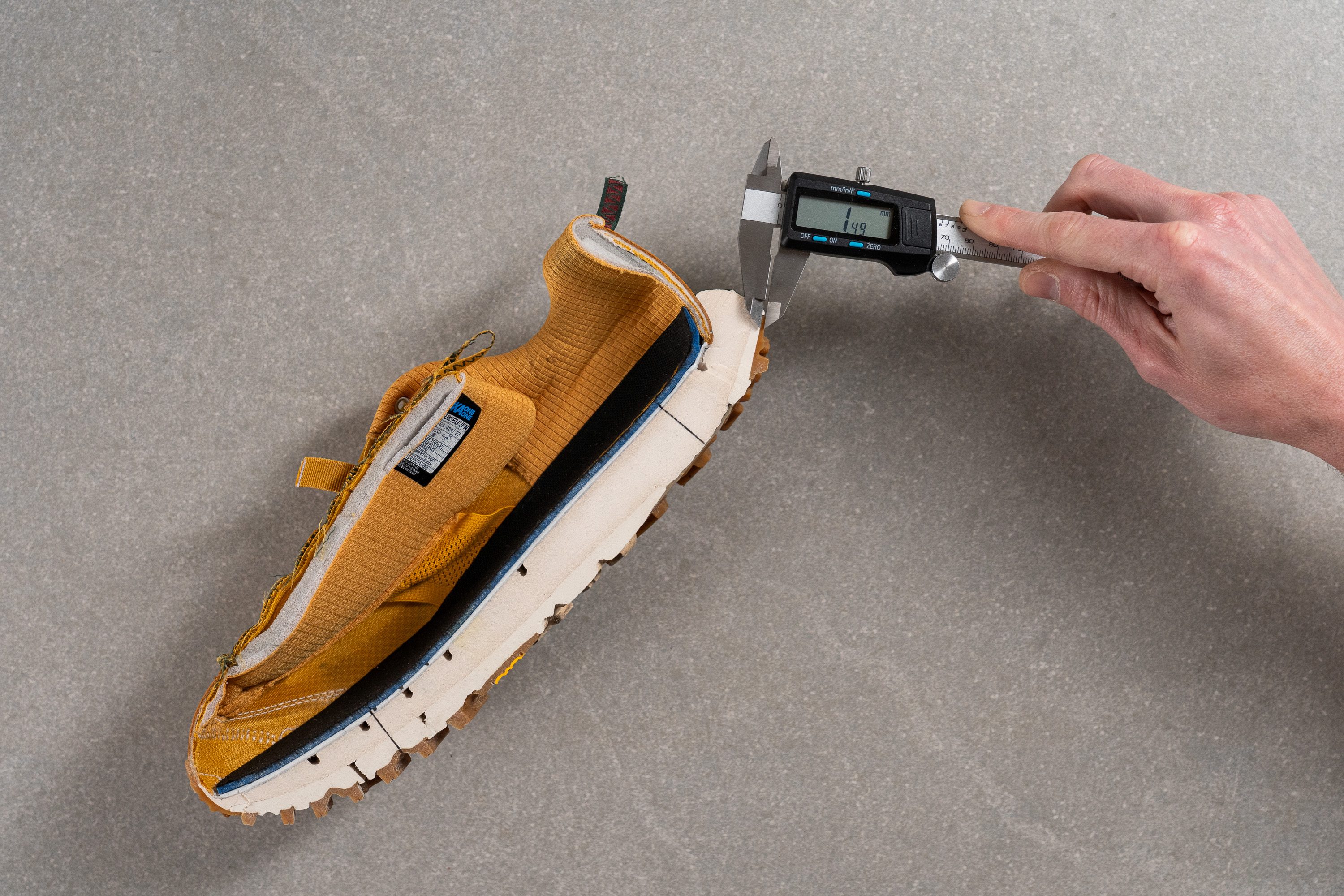
| Hoka Mafate Three2 | 1.5 mm |
| Average | 2.2 mm |
Misc
Insole thickness
The insole is surprisingly thin at just 3.1 mm. We understand this design choice, considering the substantial amount of foam in the midsole—a thicker insole would simply be overkill.
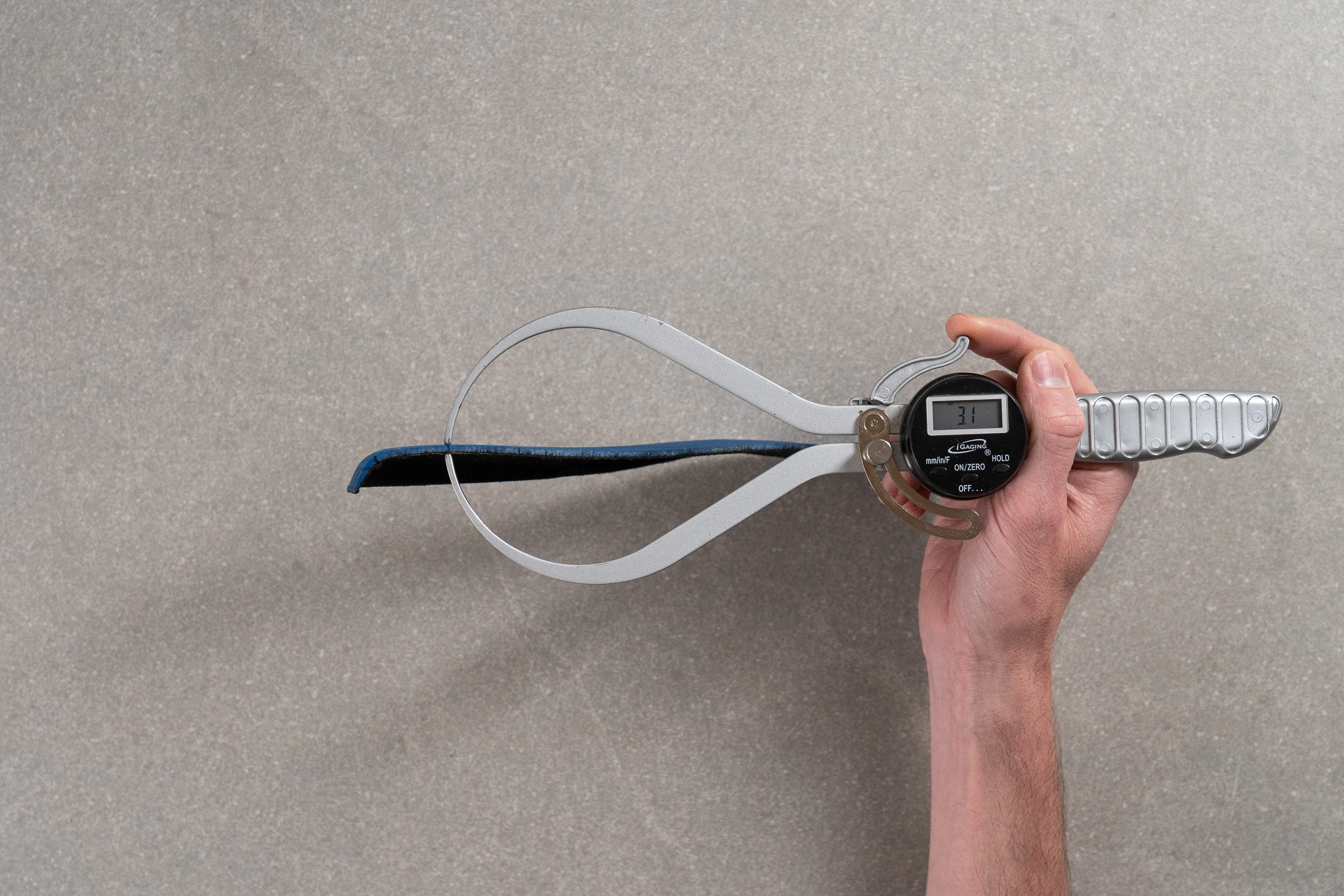
| Hoka Mafate Three2 | 3.1 mm |
| Average | 4.7 mm |
Removable insole
You can remove the insole and replace it with an alternative; however, there's a catch. The interior space of the shoe is quite limited, so keep in mind that opting for a thicker insole than the original may result in a more cramped fit.
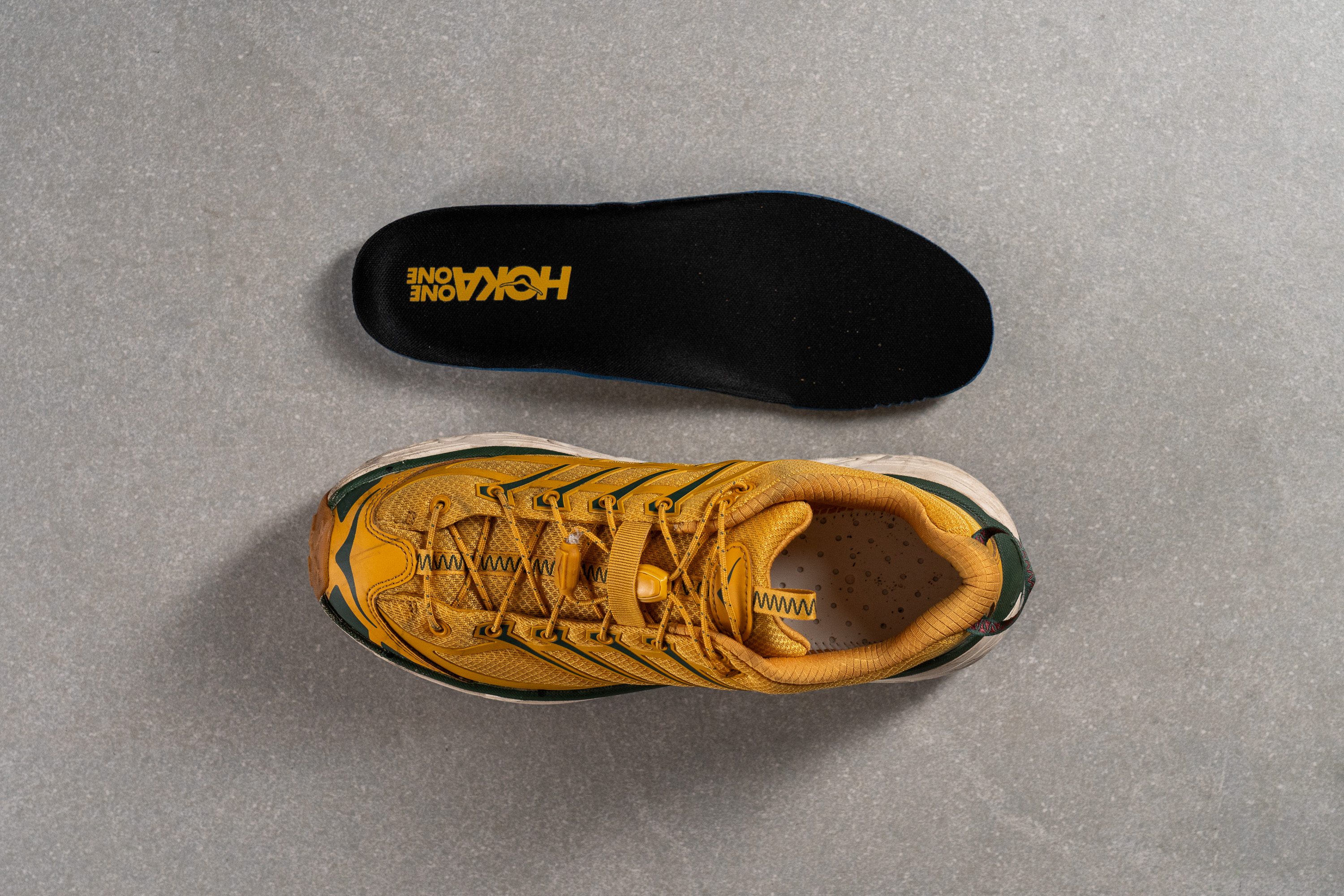
| Hoka Mafate Three2 | Yes |
Midsole softness in cold (%)
Given that the midsole it's made from CMEVA (Compression Moulded EVA) foam, we didn't expect outstanding performance under cold conditions, though we held out some hope.
Regrettably, after spending 20 minutes in the freezer, the Three2 became 38.4% firmer—a typical response for EVA-based foams, yet still disappointing for those needing reliable performance in colder climates.
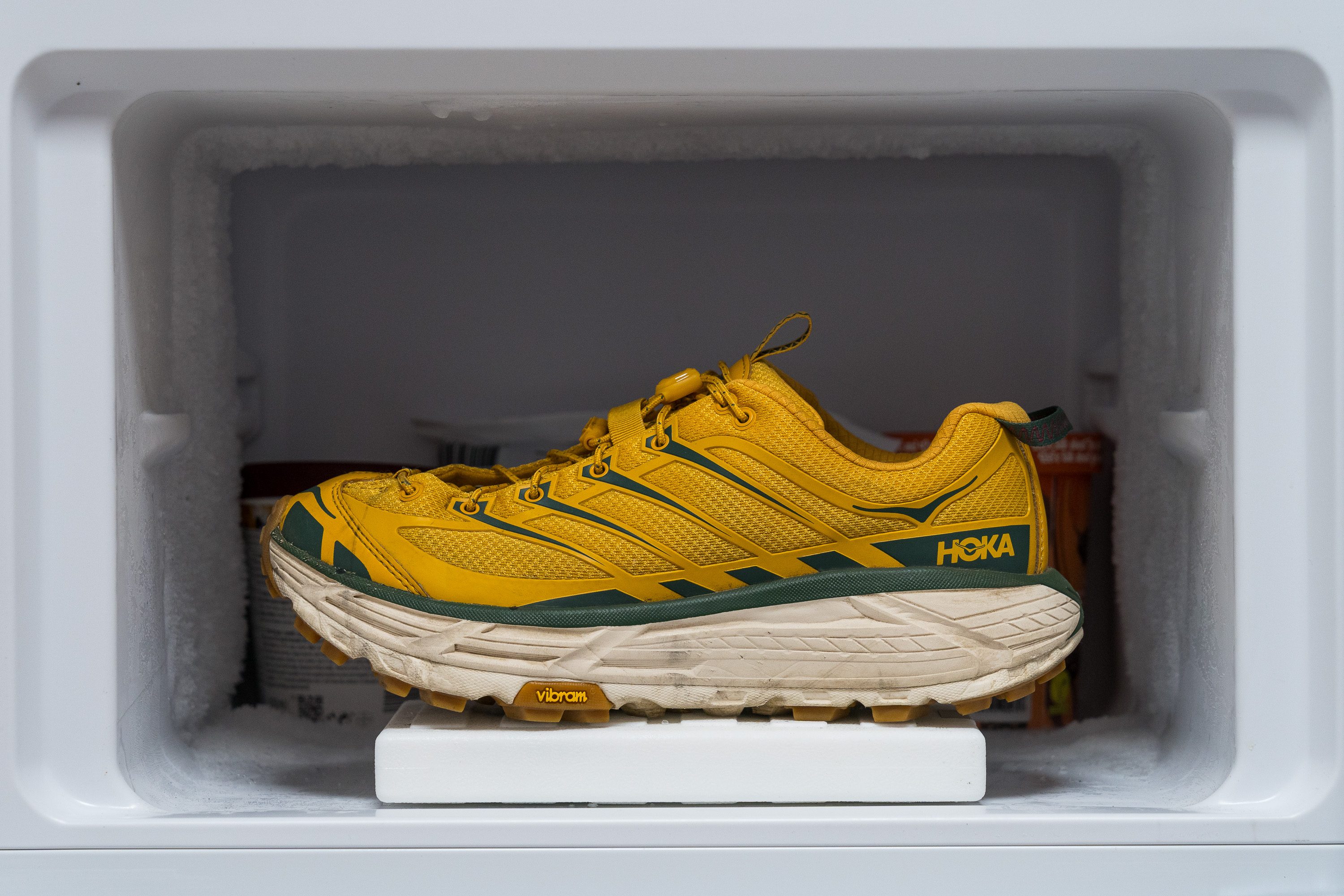
| Hoka Mafate Three2 | 38% |
| Average | 26% |
Reflective elements
Regrettably, we discovered that the Mafate Three2 lacks any reflective elements.
This oversight is particularly disappointing given its £190 price tag and the fact that it's designed for adventurous outings.
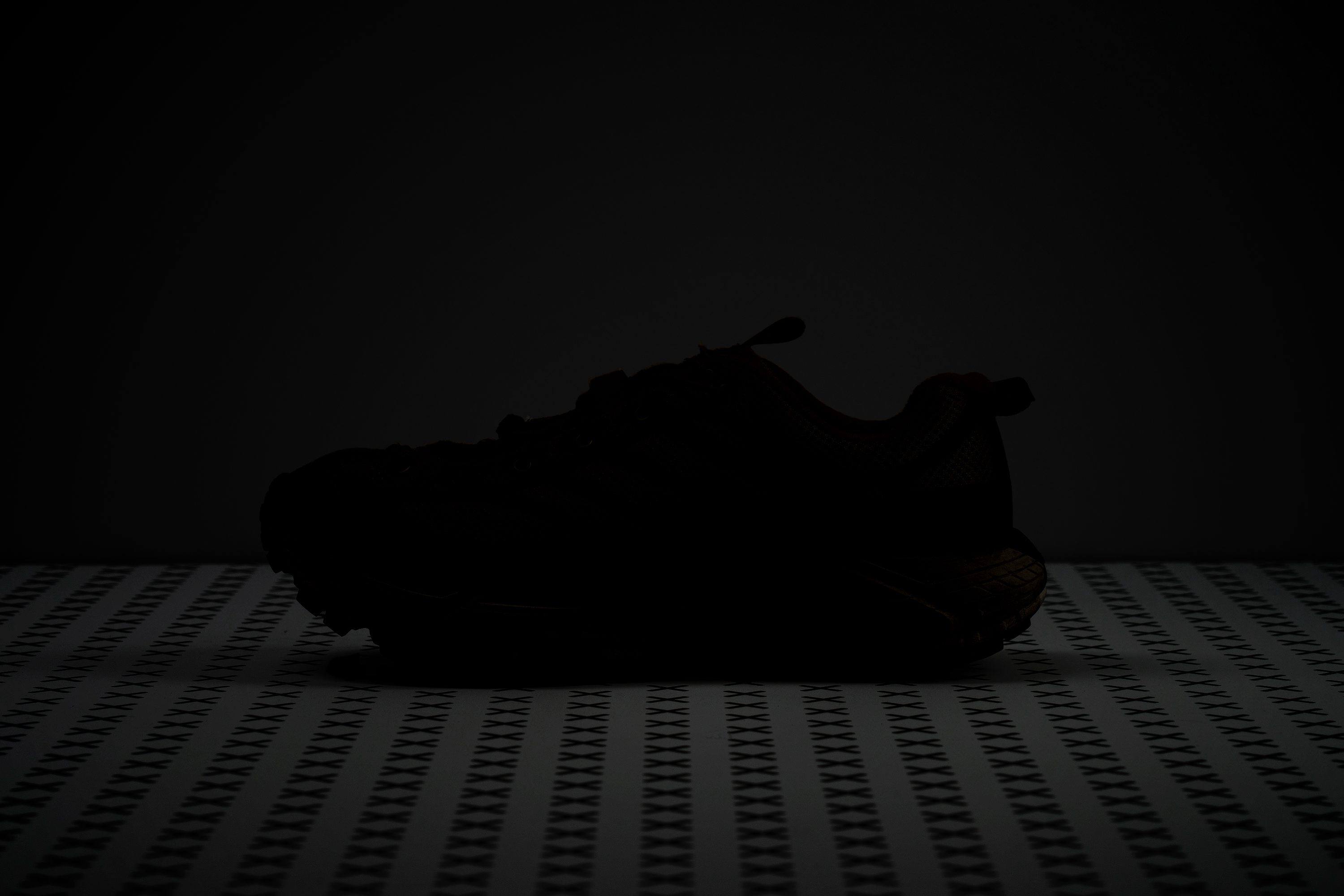
| Hoka Mafate Three2 | No |
Tongue padding
Let's be clear—the tongue is exceptionally well-padded, featuring two thick, pillow-like slabs of foam that cushion the instep and feel incredibly comfortable.
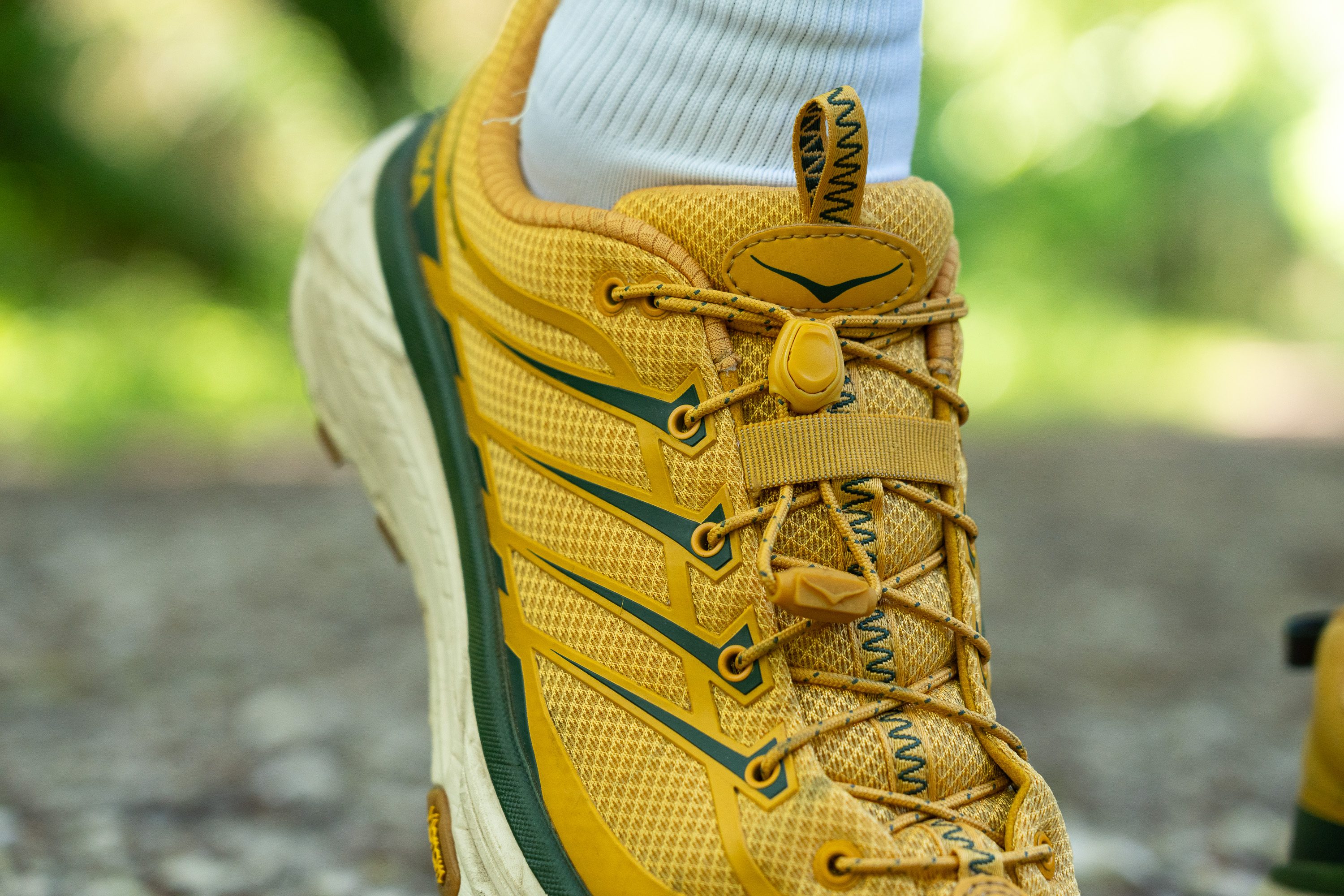
Does this 11.0-mm thick tongue come with a weight penalty? Absolutely, but the trade-off is likely worthwhile for many, especially for those who use this shoe occasionally for running but primarily for everyday, casual wear.
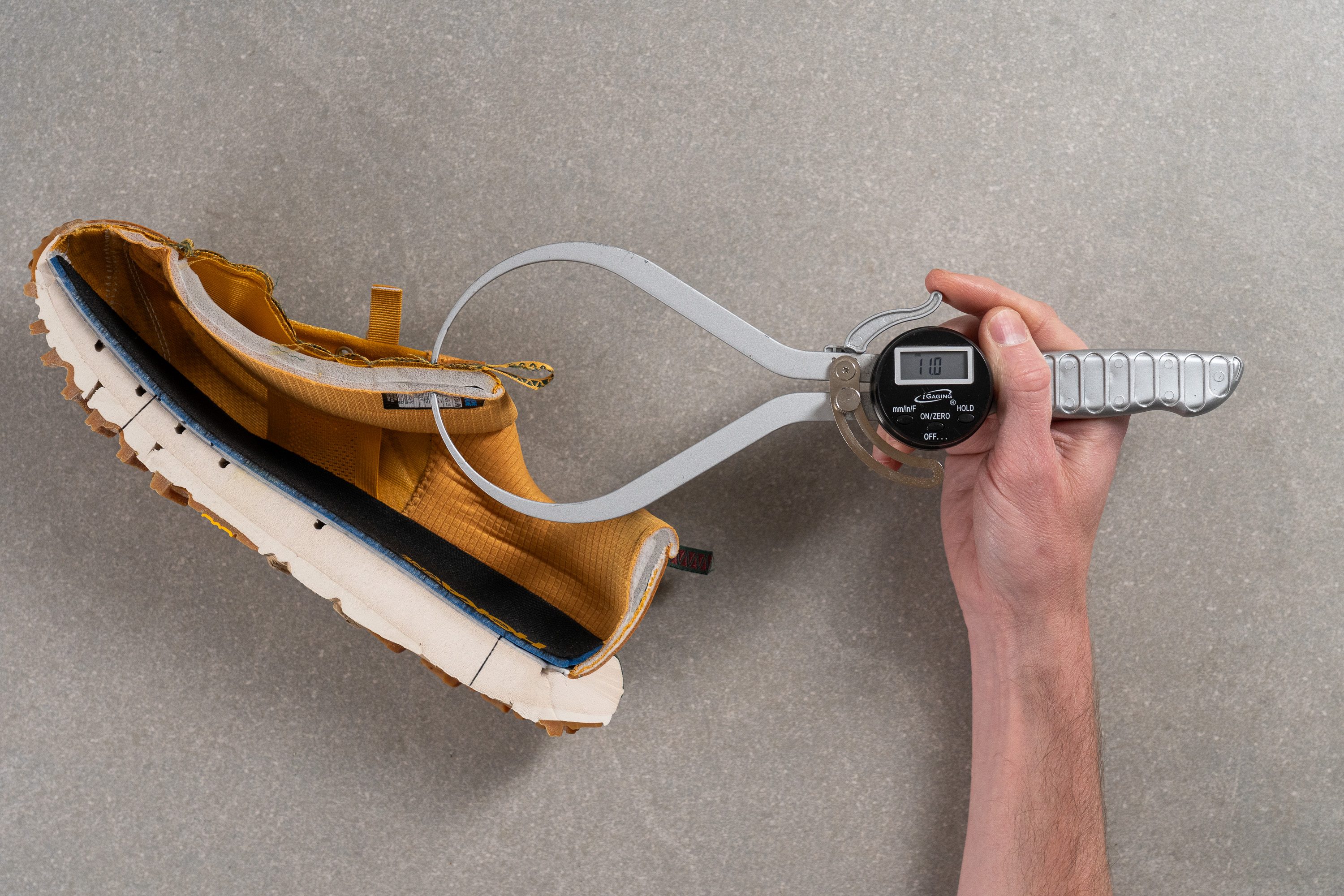
| Hoka Mafate Three2 | 11.0 mm |
| Average | 6.4 mm |
Tongue: gusset type
The tongue is semi-gusseted, a fitting choice for this snug design. However, trail runners encountering small debris in their favourite paths might have preferred a fully-gusseted tongue.
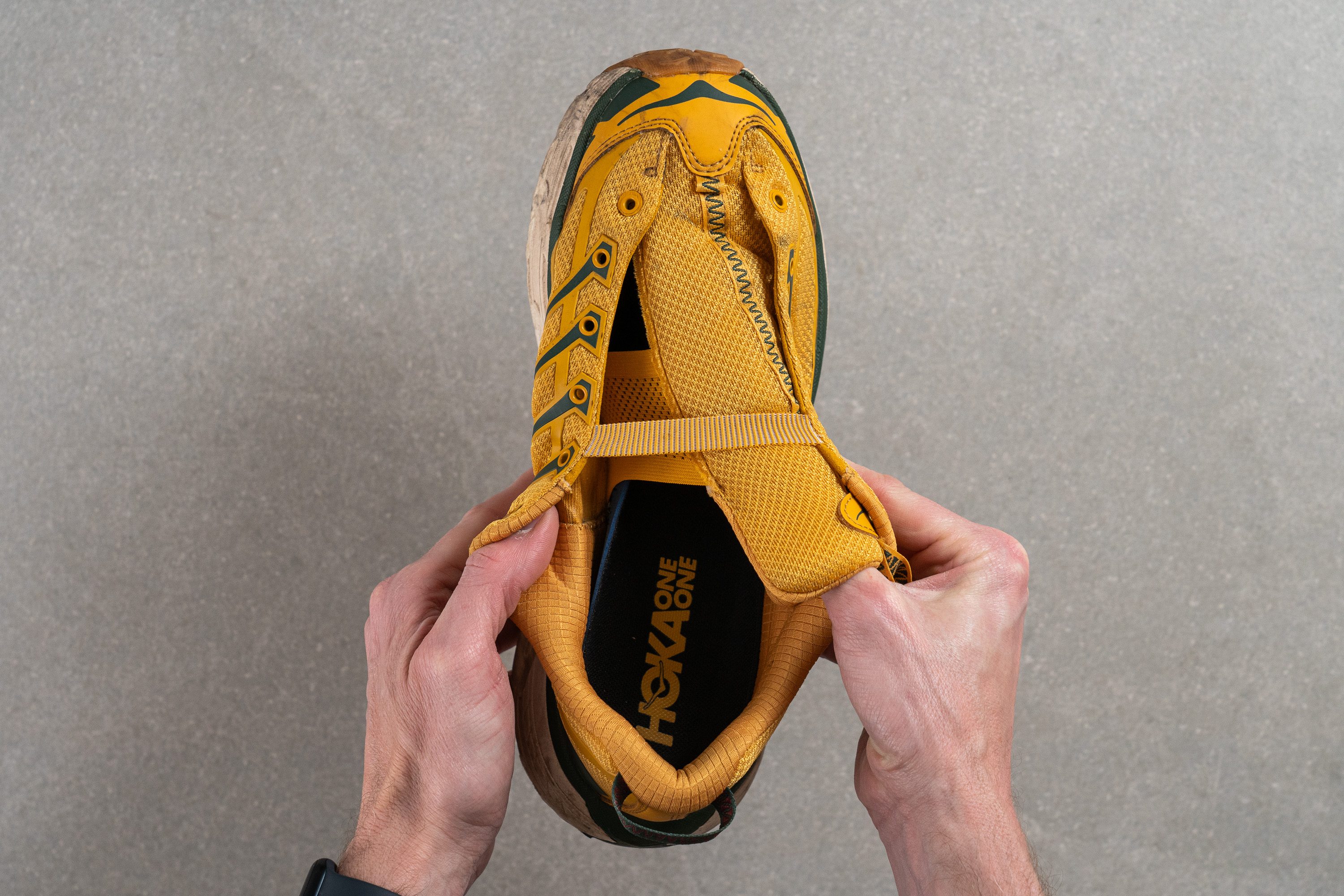
| Hoka Mafate Three2 | Both sides (semi) |
Heel tab
The heel of the Three2 includes a horizontal finger-loop heel tab, which significantly aids in sliding your feet into the shoe.
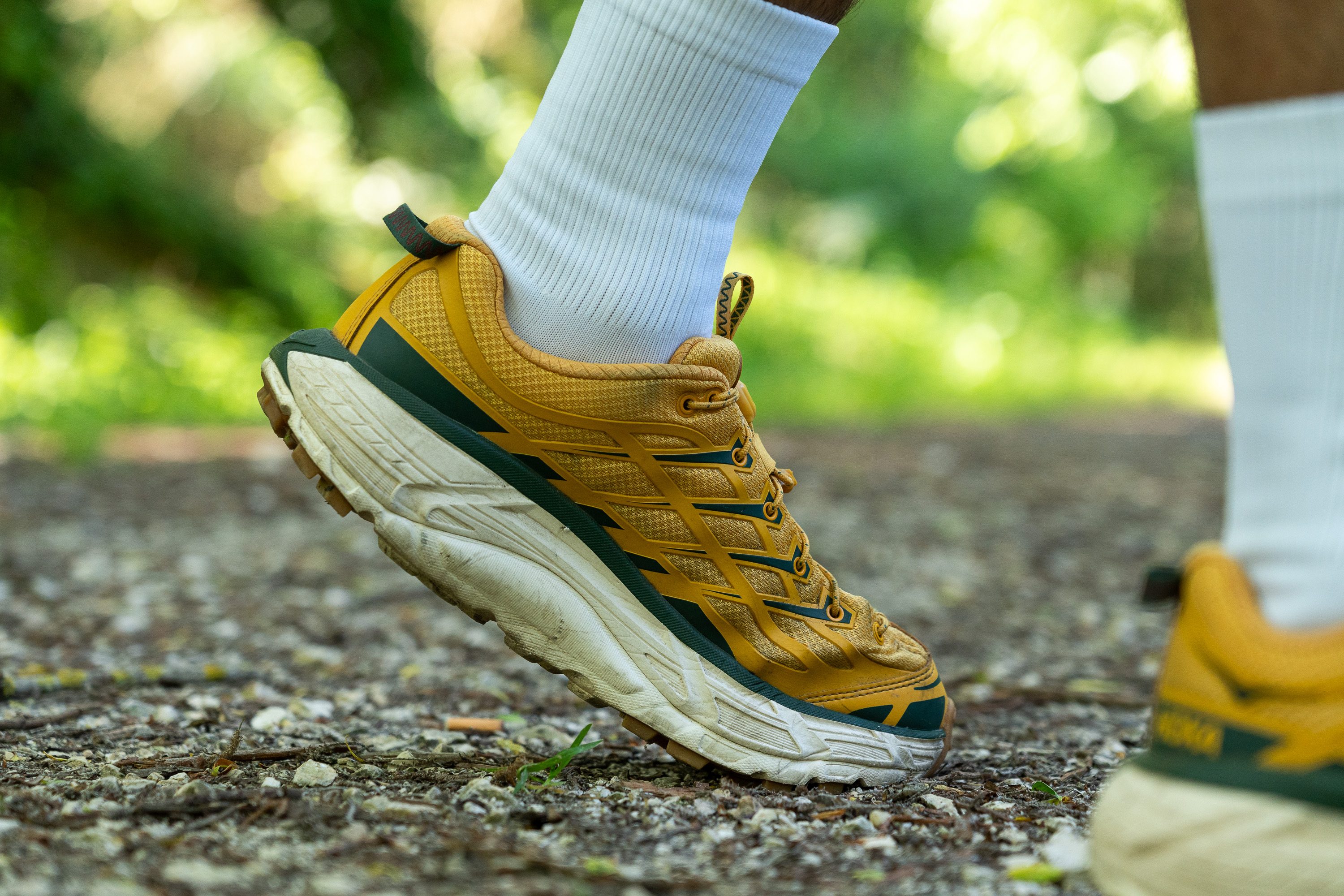
| Hoka Mafate Three2 | Finger loop |

